#<- entirely what I based this illustration on
Explore tagged Tumblr posts
Text

My Baby Don't Cry, She Just Sleeps Through The Night. [Patreon | Commissions]
#T'Pol#Elizabeth T'Les Tucker#bea art tag#star trek ENT#ENT#st ent#st enterprise#Points of Interest: The unstable katra - the gummy connection and the sickly sweat - the darkness 'eating away'#the song's called 'No More Birthdays' and it doesn't match except for a few lyrics#but the lyrics that do...........................#'My Baby don't cry she just sleeps through the night / She don't fuss she don't whine#She stays perfectly quiet.'#<- entirely what I based this illustration on
69 notes
·
View notes
Text
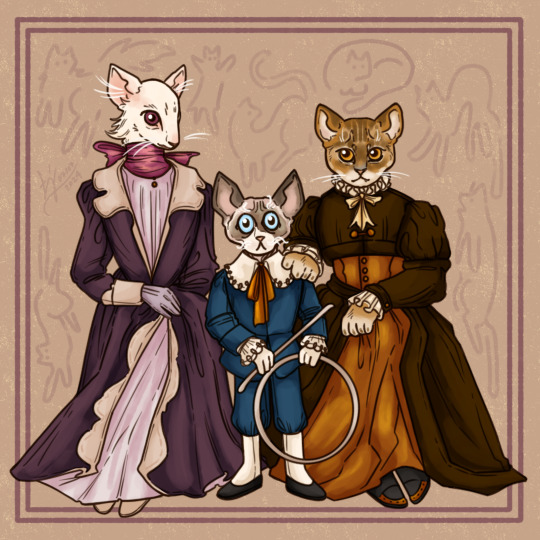
a little victorian boy and his elderly maiden aunts
[i love @pangur-and-grim's weird cats and wanted to draw them beatrix potter style]
#em draws stuff#other people's cats#I Forgor what my tag for beatrixpotterifications was...#I love freaky miss fairy and round bobo and the New Baby young mister hoop-and-stick and so I Had to draw them#pangur's outfit is based on a walking suit from 1897; grim's outfit is based on a cozy winter ensemble from 1892#both slightly modified for being on Kittycat Ladies...#belphegor's outfit is. an amalgamation of cover illustrations for little lord fauntleroy. I couldn't resist.#still not entirely satisfied with grim... she's a hard one to capture. beautiful glaring grumping lady.
4K notes
·
View notes
Text
early days in The Archives
#i spent an unreasonable amount of time on this#like truly ungodly#i regret nothing#drawing this was fun because i had exact zero reference to the looks of anything except for other people’s interpretations#therefore this was based entirely on vibes#no i do not know what an archive looks like and i will not be looking it up#this was therefore made to resemble the nicest layout archival place i know (my middle school library)#art#digital art#illustration#fanart#digital painting#tma#the magnus archives#the magnus archive fanart#tma podcast#tma fanart#jonathan sims#martin blackwood#sasha james#tim stoker
135 notes
·
View notes
Text
"But doesn't having a notion of 'balanced' combat inherently imply that all combat encounters are expected to be fair and winnable" well, no – it implies only that the GM has the ability to know whether a given combat encounter is fair and winnable.
There's a story that's been going around for decades about a Dungeons & Dragons party who encountered a large room full of treasure while exploring a dungeon. Immediately suspicious, they asked their GM a series of detailed questions about the room, but no obvious dangers were identified. Satisfied, they moved into the room – and were immediately set upon and eaten by the dragon that had been sitting atop the pile of treasure the whole time, which the GM hadn't mentioned because the players never specifically asked about the presence of living creatures within the room.
While this is obviously an extreme and ridiculous case, it illustrates an important point: as GM, you're the group's eyes and ears. If you don't describe something, the player characters literally can't see it – that dragon was effectively invisible from their perspective. The trick is that active malice isn't the only way to invisible-dragon your players; a group can also find themselves invisible-dragoned because the GM simply failed to provide sufficient information for the risk in question to be identified. This can happen through neglect, but it can also happen because the GM themself was unaware that the risk was present.
Now, hold on, you might be saying: the GM "plays" the entire world. How is it possible for the GM not to know that a risk is present? Well, that brings us back around to the subject of combat balance.
A game in which "balanced" combat is a meaningful thing to discuss is typically going to be one in which both the players and the GM are actually making strategic, tactical, and/or logistical decisions, rather than merely producing a description of their characters making such decisions. Without a good handle on the interplay of these decisions, it's completely possible for the GM to be wrong about the level of risk the scenario they've constructed entails.
That's actually pretty critical, because even if you don't care about the game being fair and winnable (and that's a perfectly valid stance), your players are still depending on you to be their eyes and ears, and to give them enough information to make good decisions about whether the fight in front of them is one they can win. A game where not every fight is expected to be winnable needs to be a game where the players have the opportunity to walk away.
No matter how objective you try to be, your own sense of the answer to that question is inevitably going to colour how you communicate about it. You being wrong about the level of risk at hand inherently increases the chance that your players will make bad choices. The party eating a TPK because they made a stupid decision is one thing; the party eating a TPK because they made a decision that looked reasonable from their perspective based on your unwitting miscommunication of the level of risk involved is quite another!
Sure, once the dice hit the table I'm probably going to realise that I fucked up, and I can adjust things on the fly to bring the level of risk that's actually present in line with the level of risk I communicated – but that's extra work I don't need with everything else that's on my plate. And that's a best-case scenario; if I'm running the game for a hardcore let-the-dice-fall-where-they-may group (and such groups tend to have a pretty significant overlap with groups that are cool with not every fight being winnable), I may not be able to adjust the fight's parameters on the fly without violating the social contract of the table.
Basically, whenever I see an OSR game with tactically crunchy combat brag about how its author never even thinks about "balance", what that's telling me is that running this game is going to create a whole lot of extra work for me as a GM. This is not a selling point.
1K notes
·
View notes
Text
youtube
We're thrilled to announce that Slay the Princess — The Pristine Cut is releasing on PC, Mac, Linux, and consoles on October 24th! Please enjoy this animated trailer ^^
For those of you who aren't aware, The Pristine Cut is a free upgrade to the base game, that among other things:
Expands the game by roughly 35%. This means thousands of new voice lines, over a thousand new illustrations, and 17 tracks of brand new music.
Adds significant glow-ups for The Fury, The Den, and the Apotheosis, each of which has over three times as much stuff to see as they had in the base game.
Introduces three brand new Princesses that branch off of The Damsel, the Prisoner, and the Spectre.
Adds an entirely new ending to the game.
Adds a deep, interactive gallery to help you chart your progress across over 420 unlocks and that brings back your best (and worst) memories with the Princess.
Provides subtitle support for: Simplified Chinese, Traditional Chinese, European Spanish, Latin American Spanish, Brazilian Portuguese, Korean, Japanese, German, Polish, French, Russian, and Italian.
Brings the game to consoles — PS4 + 5, Nintendo Switch, and Xbox! And if you're the sort who collects things, both the PS5 and Nintendo Switch versions are getting a physical release, including a collector's edition!
And for those of you who have been waiting for an EU-friendly version version of the collector's edition that doesn't get hit by a ton of import fees, we're thrilled to finally reveal that we have one! Its contents are a little different from the US version of the CE — it swaps out the statue for a poster — but it should be a much more affordable alternative!
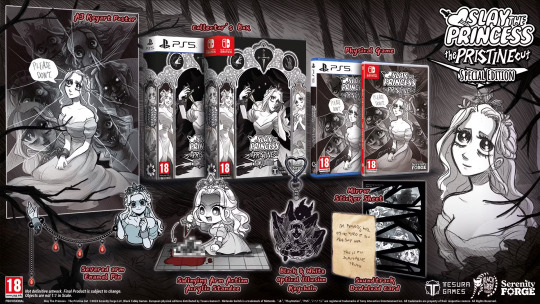
But wait, there's more!
You know how The Pristine Cut is coming out the day after Slay the Princess' one year anniversary? Well... we've also got something for you on
the one year anniversary itself! Join us, Jonny, Nichole and Brandon for a big ol' livestream on our Twitch channel. Abby will be drawing EACH Princess live (new Pristine Cut princesses excluded), we'll be chatting about what it was like to work on the game, and we'll even be playing through one of the many paths through an expanded Pristine Cut route to give you a little taste of what's to come!

AND THAT'S NOT ALL!
We've also got you covered on the merch front! T-shirts and optical illusion Spectre keychains are now available on Serenity Forge's website, and for all of you Pin-Heads, we even have some extra Pinny Arcade Princess pins from this year's PAX West. Get 'em while they're hot!
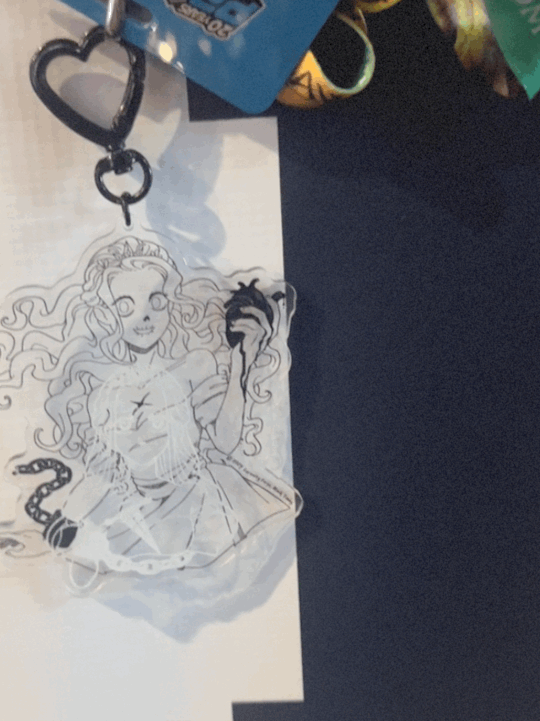
And finally, a teaser for what's to come. I think you'll all really like what we've got cooking here >:3
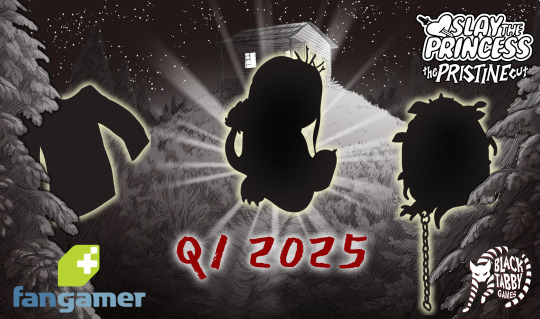
Thank you all so much for your love and support — it's because of all of you that we're able to take big, ambitious swings with our work. If you haven't had the chance yet and you liked Slay the Princess, consider picking up our other Equally Good visual novel, Scarlet Hollow, which will be getting an enormous fifth episode next year!
All the best, Tony and Abby
2K notes
·
View notes
Text
Anyway, here are my thoughts about what each of the companions would present on if they had to give the rest of the party a PowerPoint presentation:
Gale: A completely accurate and detailed lecture regarding the theories of teleportation magic, how it works, and the differences between it and plane shift. There are multiple charts and graphs.
Wyll: “Choosing your hero name: an adventurer’s guide” He does have suggestions for the entire party.
Karlach: “Ranking bars in the gate based on how much they remind me of Avernus.” She has provided illustrations that she made herself. Anything in the Upper City is ranked “like Avernus” because “occupied entirely by pricks.”
Shadowheart: “So I was wrong about Shar: a reluctant apology.” It’s mostly a debunk of Shar’s lies but the entire time it does look like she is pulling teeth. However, she cheers up considerably when she presents on some of the church’s secrets, including the weird ass code names for things that she always thought were a little silly.
Lae’zel: a very educational and complete history of her people’s war against the mind flayers. It’s all rather academic until the last slide which says “AND THIS IS WHY WE DON’T EAT THE WORMS” in all caps.
Astarion: “Ranking you by whose blood I’d want to drink most.” In order, it is as follows Gale (rancid), Karlach (spicy), Minthara (probably is poisonous after all the poison she’s been exposed to), Jaheria (that story about what she did to one of the spawn was memorable), Shadowheart (does cleric blood taste radiant?), Lae’zel (curious how Gith taste, doesn’t want to die), Minsc (large and has extra blood to spare), Halsin (can turn into a bear, think of all that real estate), Wyll (canon verified snack)
Halsin: “Foraging: what’s edible and what isn’t” Gale takes very dutiful notes given someone gave him a mushroom two ten days ago that gave the entire camp food poisoning. Astarion, the only one who did not get food poisoning, who has completely forgotten what he foraged was the culprit, takes 0 notes.
Minthara: Battle orders and tactics. All of these fools need to get whipped into shape.
Jaheria: “Get it Fucking Together: Stop Doing this Shit.” What follows is a callout of everyone’s worst habits and decisions. One slide just says “stop snitching.”
Minsc: it’s just pictures of Boo.
#iz rambles#bg3#astarion#wyll ravengard#astarion ancunin#gale dekarios#Shadowheart#minsc and boo#minthara#Karlach#lae’zel#jaheria#Baldurs gate 3
2K notes
·
View notes
Text
Viktors Disabilities, a Speculative Analysis
Ever since i first watched Arcane i have wanted to know (and i mean this in the nicest way possible,) what was wrong with Viktor. His disability was never explained beyond “he was born with a malformed leg”.
And so, i was left alone in the house with my thoughts today so i took it upon myself to figure it out, (and talk about his medical issues so i can ignore my own lmao) and i am releasing my thoughts upon yall!
(disclaimer: yes i am aware that this arcane is a fantasy world that is not our world and the disorders/illnesses and treatments will not be the same but the issues he has have to be based off of something (especially with how detailed this show is and how many references are made throughout.) this is not me trying to say that he definitively has any of these conditions, i’m just comparing them to conditions that exist today and suggesting what Viktors disabilities may have been based off of.)
(disclaimer pt 2.: i have not played League of Legends, i do not intend to play League of Legends, i have only watched Arcane and i am only talking about Arcane and Arcane lore and what i have been able to figure out from watching Arcane and spinning it around in my brain like it’s in a microwave.)
Now, i think i’ll just start from the beginning, and go in order of development.
1. Viktors Leg
According to the wiki (and about every other site that talks about Viktor) he is said to have been “born with a malformed leg”, and said pretty much nothing else. Now, when Viktor is an adult, his leg appears to be very not-malformed, so, let’s start at the flashback.
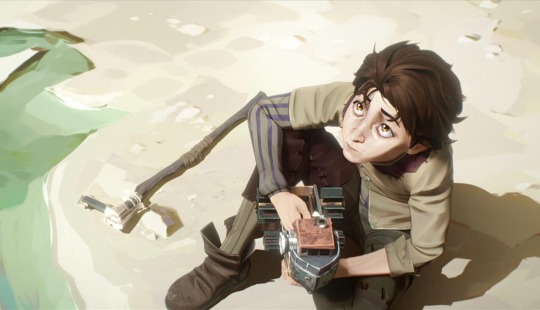
Now, even in the flashback Viktors leg looks normal. It’s pointing forward, and looks totally fine. But as the clip goes on, and he gets up and starts moving, the problem becomes apparent. Here’s a clip:
Yall have probably already noticed what i’m talking about with this clip, but i want to illustrate it more because the clip moves so fast:
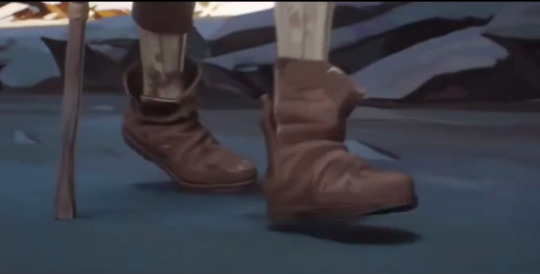
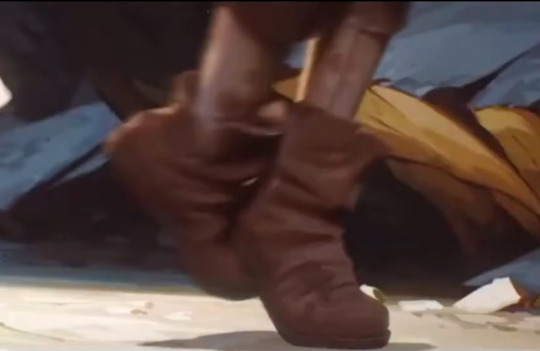
As Vikto moves faster, his foot shifts inwards! It shifts inwards pretty severely (i mean, he full on trips on it), and the only time in this entire clip where it is doing so. And that is because the other times he is around someone else. I think he is purposefully pointing his foot forward and in turn walking on the wrong part of his foot (balance issues), and more than likely causing himself pain 1. to appear less ‘crippled’ and more “normal” to other people, and 2. because clearly, his foot is pointing inwards to a degree that is impairing his ability to walk.
Now to me, (and i’m not a doctor so if any actual doctors want to call me on incorrect information please do so!) this looks like Femoral Anteversion, or a twisting of the femur that points the knees inward (it’s typically found in both legs but it can happen with just one)
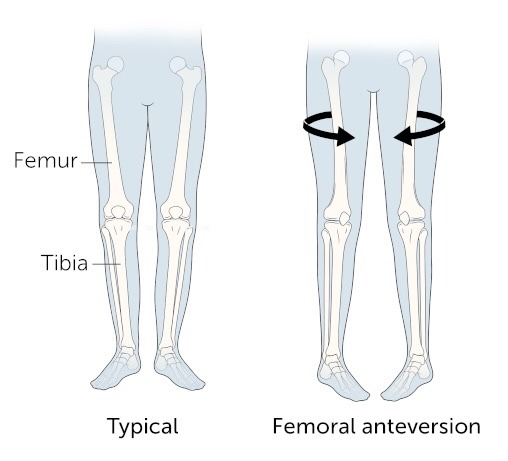
Now this isn’t necessarily a terrible thing, ~10% of children are affected with Femoral Anteversion (or “pigeon toes”), and most of the time it resolves itself, unless it is super severe, at which point it requires surgery to fix it. Which, of course, Viktor did not have access to.
Now, his leg does appear to be normal as an adult, but the femoral anteversion thought is still plausible. There are 3 reasons i can think of for this one.
1. He got to Piltover and after a little bit Heimerdinger noticed how messed up his leg was and Viktor got the surgery to correct it as much as possible (it’s implied that Viktor was in Piltover for years, based on how he acts and the fact that he’s Heimerdingers assistant) (this thought doesn’t seem very plausible to me, i don’t remember seeing any surgery scars on his leg in the hexcore scene, but it is a possibility.)
2. He’s simply just still correcting his leg. The reason we wouldn’t see him mess up like we did in the flashback is that he’s about 24-25 in act one, and i’d say that 14-15 years is probably enough to get used to doing that sort of thing.
3. (Honestly this one seems to be the most plausible to me) His leg has (partially) corrected itself. Most children whose femoral anteversion fixed itself had normal gaits by age 8-10, but that’s an average age and those typically aren’t perfectly accurate to everyone (i have. very personal experience with that.) and it makes the most sense to me that his leg has mostly/partially corrected itself and he’s just also continuing to self-correct to avoid appearing any more disabled than he already does (he shows quite a bit of internalized ableism throughout the season, and his line about people not listening to him because he’s “just a poor cripple from the undercity” really drives it home for me, honestly.)
2. Viktors Deterioration
When we first truly see Viktor in act 1, he seems lively, and unless he’s actively walking, he’s not using his cane, not really (he hangs his cane on his arm to read a book with both hands (really great rep btw, we do in fact do that!), he leans it against a desk to pace in front of a chalkboard with Jayce, he puts it down somewhere to go help Jayce with the experiment, etc.).
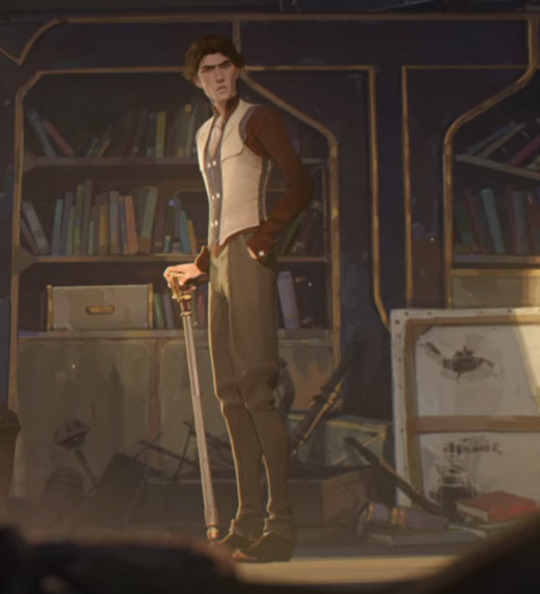
I mean, look at his stance, he’s not really leaning on his cane for support, more likely he’s using it for balance, and as an assist to his bad leg, rather than an attempted replacement like we saw in the flashback.
But in act 2? Hoooo boy
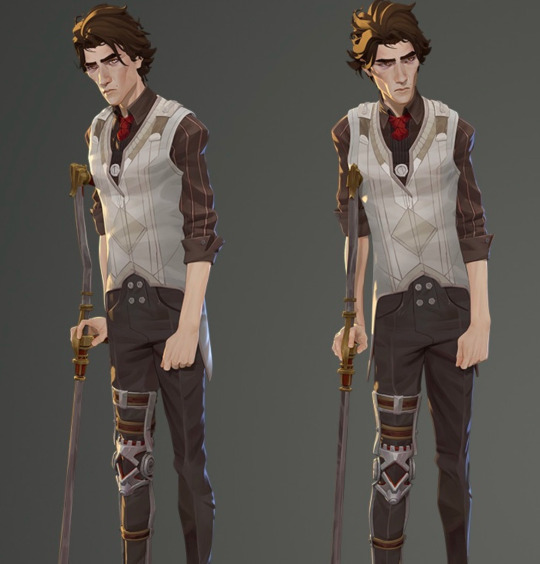
Look at that, beyond just looking 10x sicker, look at his posture, his shoulders specifically. He is actively leaning on his crutch (because he needs a crutch now, the cane wasn’t enough), using it like a replacement. Now, over the course of the ~7 year time skip, Viktors condition has deteriorated enough that he 1. needs the braces 2. needs a crutch 3. can no longer even get up without his crutch, let alone take a single step!
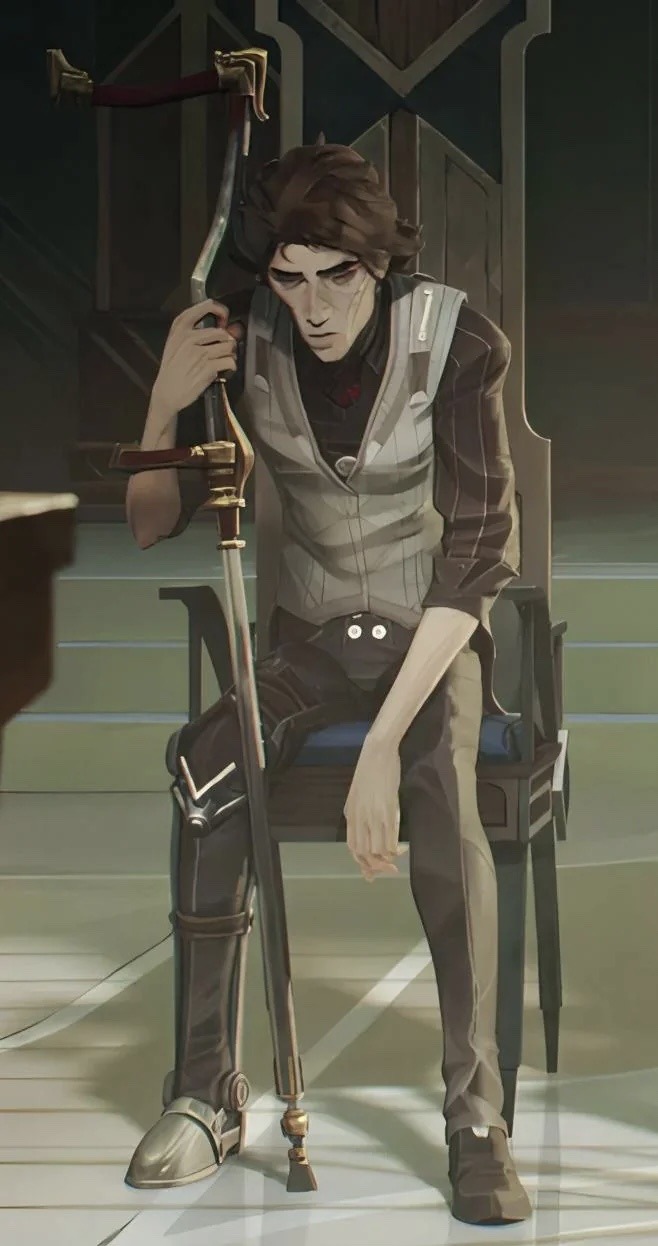
i mean, even when he’s sitting down, he’s holding onto it, leaning on it. The way he uses his crutch, how skinny he’s gotten, how much more tired he seems, all of these things say some sort of newfound muscle weakness, but why?
And the braces. Let’s start with the leg brace, since it’s right there. How it’s built around the actual leg and knee looks a whole lot like a much cooler unloader knee brace, or a knee brace that redistributes weight away from the weakened knee. I have to wear one of those when my knee gets really bad in the winter, when it starts buckling randomly and just.. not working. Which makes sense for the muscle atrophy/weakness theory i have, because that leg was already weak to begin with, and his knee would have been all kinds of fucked up if he did spend basically his whole life misaligning it like i’m thinking he did. (and to support that theory even further, the way that the brace goes over his foot as well reminds me of the braces some children wear to attempt to correct their ‘pigeon toes’ (which have been proven not to work, btw)
Now, the back brace. I’m gonna be honest, this part took me the longest, it truly confused me.
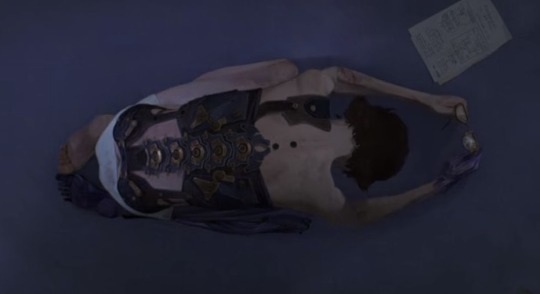
When you look at it, it just looks like a thoracic back brace, with some extra support on the hips (once again, pointing to muscle weakness)
But the thing that really confused me?
The screws in his back.
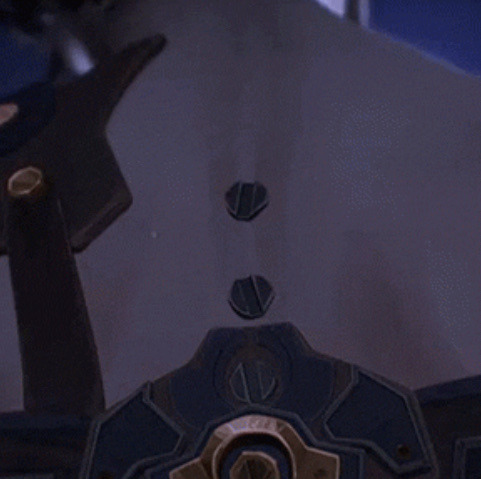
It took me an embarrassingly long time to figure out what procedure this was referencing (Percutaneous Pedicle Screw Fixation (i’m like really sure that the screws aren’t showing in the real life surgery but the fact that they are makes sense with Arcanes style)), and an even more embarrassing amount of time to realize that the golden screws in his brace weren’t connected to him. (i am. very tired.)
But essentially, a Percutaneous Pedicle Screw Fixation is a less invasive spinal fusion procedure. Now a spinal fusion can be done for many, many reasons, but only one really fit.
Support, because of muscle weakness.
Every single thing that got added on to Viktor could be explained by muscle weakness, but there’s never any explained reason why he was so weak all of a sudden. His terminal illness is cited as a reason but that didn’t really make sense to me, all of these procedures, all of these mobility aids made perfectly to his measurements would’ve had to have been caused by something with a much slower onset than the illness would have given him.
And after literal hours of scouring, i have a theory.
Post-Polio Syndrome.
The timeline makes sense, Viktor would have most likely gotten sick before the flashback, when he was a child (a lot of children who get Polio fight it off without even knowing they have it). Viktor is estimated to be about 32 in act 2, and the average time between the initial Polio infection and Post-Polio Syndrome onset is about 20-40 years (inconsistent numbers).
Now some of the symptoms we have no way of knowing if they affect Viktor or not, but the main ones that caught my eye were muscle atrophy, chronic fatigue, and, you guessed it, muscle weakness.
Given where Viktor lived as a child, and how heavily polluted it was (remember that Viktor was in the undercity over 10 years before we saw it in act 1 with Vi and Powders childhood), it’s not too far of a stretch to say that he could have contracted an illness very similar to Polio as a child, and only really be feeling the affects of it now.
3. The Illness
I have 2 main theories for Viktors illness, the first one seems to be the most popular among the fandom: Tuberculosis.
If you’re unaware, Tuberculosis (TB) is a sickness that mainly affects the lungs, with the main symptom being coughing up blood. Now this is a really good theory imo, it fits pretty well, with some of the other symptoms being muscle atrophy, fatigue, malaise (general feeling of discomfort/unease with no discernible reason), loss of appetite, and severe unintentional weight loss. all of this sounds like our guy, no?
TB can take weeks to be symptomatic, so we probably just caught Viktor at the worst time ever lol with this theory.
My other theory is actually one my friend suggested to me, and that theory is COPD.
Chronic Obstructive Pulmonary Disease (COPD) is a progressive disease that is basically a terrible combination of chronic bronchitis and asthma that can be caused by exposure to pollution (Viktor grew up in the Undercity before Cassandra’s vent system, i mean the river he was playing on had an oil slick on it, i think it’s safe to say he was exposed to some pretty severe pollution as a child.)
This theory makes a lot of sense to me, because it’s said in the show that his illness was probably caused by the air where he grew up, which this would have been, while TB would not. (not 15-20 years later, at least) COPD, once it reaches stage 4 is very severe, any flare up of symptoms could be life threatening at that stage, and the symptoms? Fatigue, shortness of breath, coughing, weight loss, and less frequently, coughing blood.
Anyway, i guess that concludes my analysis/comparison? I’m gonna repeat that i’m not definitively saying that ‘he has this condition and this is why!’, i’m just analyzing and speculating on what different parts of his disability is based on in real life. So, let’s just all be nice, yeah? (also PLEASE feel free to use this as a reference point for modern aus and stuff!!)
i do genuinely think that Viktors disease progression and his deterioration is one of the best examples of chronic illness that i have seen in media, in my experience (both with my own issues and what i’ve seen in other people) and Viktor himself is one of the BEST representations of what it’s like to be young and disabled and the internalized ableism that comes with it (if anyone wants to hear about that i will happily yap your ear off about it!
Anyway, for real this time. Yap session over.
[edit: if you like this you should look in the reblogs there’s a couple of really good in-depth deep dives from others that build on this!!]
#also i am 100% behind the hc that Jayce designed and built Viktors aids#viktor#viktor arcane#arcane analysis#arcane#arcane theory#media analysis#disabled representation#viktors disability isn’t talked about enough :(#viktor arcane i adore you#AUGH I LOVE HIM SO MUCH IM SOBBING
720 notes
·
View notes
Text
The acting in Dead Boy Detectives is amazing, but one of the things I haven't seen mentioned much is how much thought goes into the delivery between lines, the sorts of decisions that probably aren't noted in the script.
There are so many examples of this all throughout the series, but I want to call out this little moment.
It's a high stress situation. Edwin is incredibly tense. The whole fiasco with the Cat King has him genuinely upset. The case has started to go sideways, and Charles is doing his best to calm Edwin down.

So watch what Charles does. While Edwin's paying attention, he's all reassurance. He tells him he's there to help. He coaches him to breathe. He's all easy smiles.

But my God, the second Edwin stops paying attention, that smile drops immediately.

Charles is stressed, too. This boy, who has spent a lifetime trying to be good enough, has been doing his utmost to help Edwin fix things. He keeps trying to find out why Edwin is so upset, but no matter how many times he asks, Edwin won't tell him.

The way Charles smiles, or doesn't, based on who is paying attention to him and when, is frankly brilliant. It's such a fantastic character choice, and it perfectly illustrates the way he wears his smiles when he thinks other people need them.
In this moment, it's on full display: this smile is entirely for Edwin, to help Edwin feel more comfortable in a fraught situation.

It's not about what Charles is feeling at all.
#dead boy detectives#payneland#charles rowland#edwin payne#dbda#meta commentary#netflix#dbda positivity
626 notes
·
View notes
Text
NASA Inspires Your Crafty Creations for World Embroidery Day
It’s amazing what you can do with a little needle and thread! For #WorldEmbroideryDay, we asked what NASA imagery inspired you. You responded with a variety of embroidered creations, highlighting our different areas of study.
Here’s what we found:
Webb’s Carina Nebula

Wendy Edwards, a project coordinator with Earth Science Data Systems at NASA, created this embroidered piece inspired by Webb’s Carina Nebula image. Captured in infrared light, this image revealed for the first time previously invisible areas of star birth. Credit: Wendy Edwards, NASA. Pattern credit: Clare Bray, Climbing Goat Designs
Wendy Edwards, a project coordinator with Earth Science Data Systems at NASA, first learned cross stitch in middle school where she had to pick rotating electives and cross stitch/embroidery was one of the options. “When I look up to the stars and think about how incredibly, incomprehensibly big it is out there in the universe, I’m reminded that the universe isn’t ‘out there’ at all. We’re in it,” she said. Her latest piece focused on Webb’s image release of the Carina Nebula. The image showcased the telescope’s ability to peer through cosmic dust, shedding new light on how stars form.
Ocean Color Imagery: Exploring the North Caspian Sea
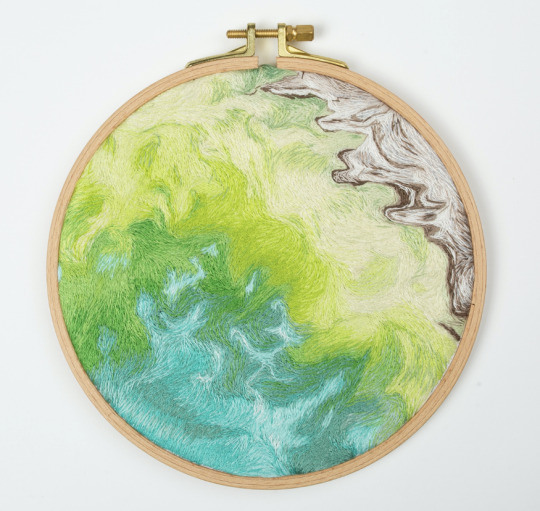
Danielle Currie of Satellite Stitches created a piece inspired by the Caspian Sea, taken by NASA’s ocean color satellites. Credit: Danielle Currie/Satellite Stitches
Danielle Currie is an environmental professional who resides in New Brunswick, Canada. She began embroidering at the beginning of the Covid-19 pandemic as a hobby to take her mind off the stress of the unknown. Danielle’s piece is titled “46.69, 50.43,” named after the coordinates of the area of the northern Caspian Sea captured by LandSat8 in 2019.

An image of the Caspian Sea captured by Landsat 8 in 2019. Credit: NASA
Two Hubble Images of the Pillars of Creation, 1995 and 2015
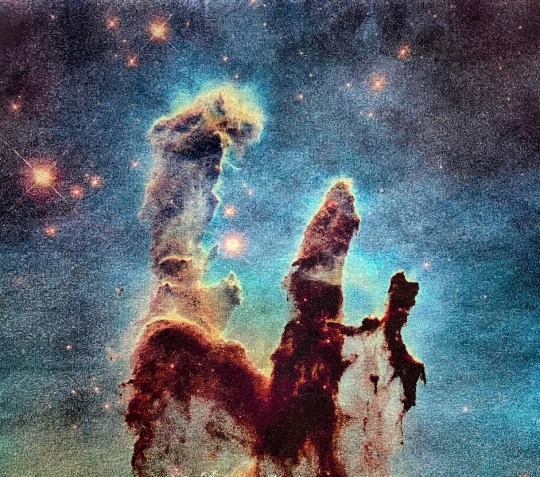
Melissa Cole of Star Stuff Stitching created an embroidery piece based on the Hubble image Pillars of Creation released in 1995. Credit: Melissa Cole, Star Stuff Stitching
Melissa Cole is an award-winning fiber artist from Philadelphia, PA, USA, inspired by the beauty and vastness of the universe. They began creating their own cross stitch patterns at 14, while living with their grandparents in rural Michigan, using colored pencils and graph paper. The Pillars of Creation (Eagle Nebula, M16), released by the Hubble Telescope in 1995 when Melissa was just 11 years old, captured the imagination of a young person in a rural, religious setting, with limited access to science education.
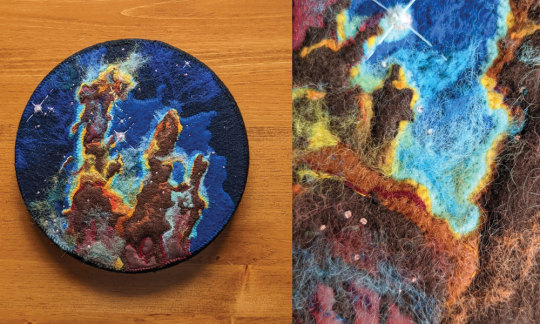
Lauren Wright Vartanian of the shop Neurons and Nebulas created this piece inspired by the Hubble Space Telescope’s 2015 25th anniversary re-capture of the Pillars of Creation. Credit: Lauren Wright Vartanian, Neurons and Nebulas
Lauren Wright Vartanian of Guelph, Ontario Canada considers herself a huge space nerd. She’s a multidisciplinary artist who took up hand sewing after the birth of her daughter. She’s currently working on the illustrations for a science themed alphabet book, made entirely out of textile art. It is being published by Firefly Books and comes out in the fall of 2024. Lauren said she was enamored by the original Pillars image released by Hubble in 1995. When Hubble released a higher resolution capture in 2015, she fell in love even further! This is her tribute to those well-known images.
James Webb Telescope Captures Pillars of Creation
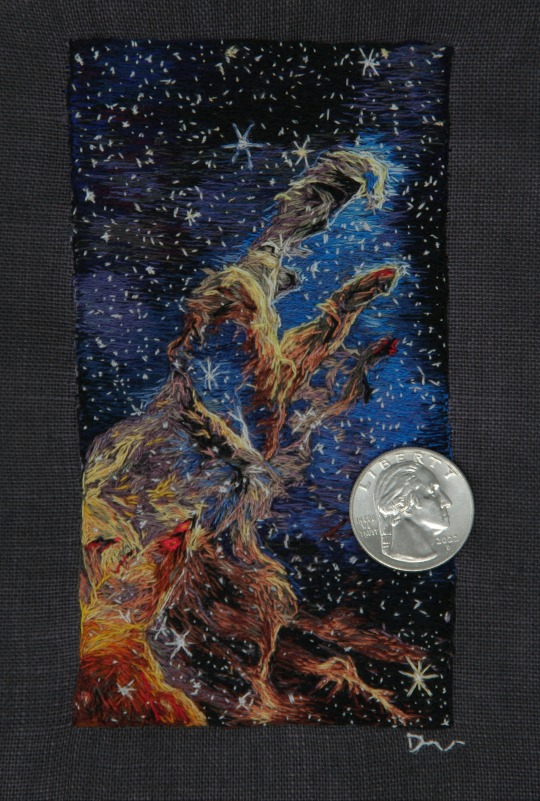
Darci Lenker of Darci Lenker Art, created a rectangular version of Webb’s Pillars of Creation. Credit: Darci Lenker of Darci Lenker Art
Darci Lenker of Norman, Oklahoma started embroidery in college more than 20 years ago, but mainly only used it as an embellishment for her other fiber works. In 2015, she started a daily embroidery project where she planned to do one one-inch circle of embroidery every day for a year. She did a collection of miniature thread painted galaxies and nebulas for Science Museum Oklahoma in 2019. Lenker said she had previously embroidered the Hubble Telescope’s image of Pillars of Creation and was excited to see the new Webb Telescope image of the same thing. Lenker could not wait to stitch the same piece with bolder, more vivid colors.
Milky Way
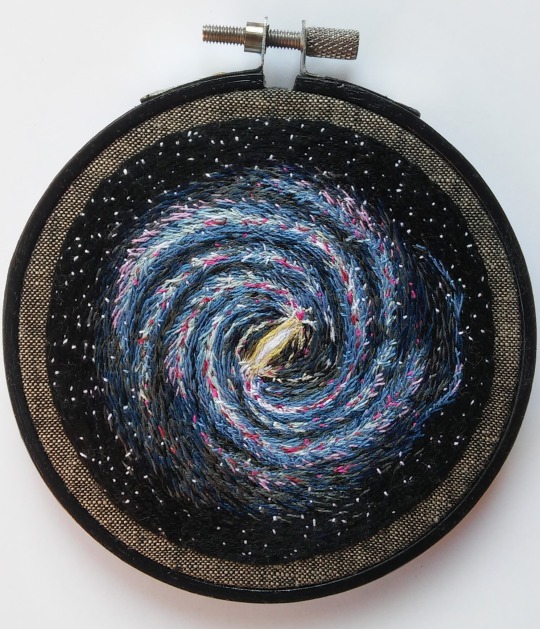
Darci Lenker of Darci Lenker Art was inspired by NASA’s imaging of the Milky Way Galaxy. Credit: Darci Lenker
In this piece, Lenker became inspired by the Milky Way Galaxy, which is organized into spiral arms of giant stars that illuminate interstellar gas and dust. The Sun is in a finger called the Orion Spur.
The Cosmic Microwave Background
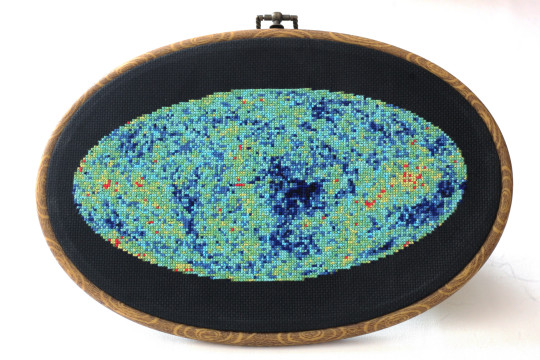
This image shows an embroidery design based on the cosmic microwave background, created by Jessica Campbell, who runs Astrostitches. Inside a tan wooden frame, a colorful oval is stitched onto a black background in shades of blue, green, yellow, and a little bit of red. Credit: Jessica Campbell/ Astrostitches
Jessica Campbell obtained her PhD in astrophysics from the University of Toronto studying interstellar dust and magnetic fields in the Milky Way Galaxy. Jessica promptly taught herself how to cross-stitch in March 2020 and has since enjoyed turning astronomical observations into realistic cross-stitches. Her piece was inspired by the cosmic microwave background, which displays the oldest light in the universe.

The full-sky image of the temperature fluctuations (shown as color differences) in the cosmic microwave background, made from nine years of WMAP observations. These are the seeds of galaxies, from a time when the universe was under 400,000 years old. Credit: NASA/WMAP Science Team
GISSTEMP: NASA’s Yearly Temperature Release
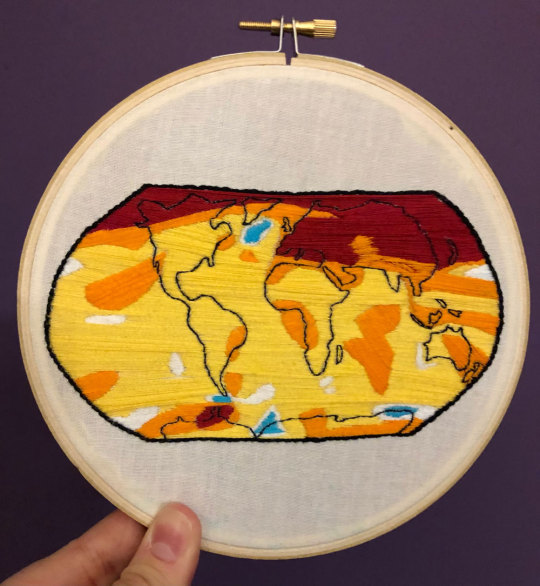
Katy Mersmann, a NASA social media specialist, created this embroidered piece based on NASA’s Goddard Institute for Space Studies (GISS) global annual temperature record. Earth’s average surface temperature in 2020 tied with 2016 as the warmest year on record. Credit: Katy Mersmann, NASA
Katy Mersmann is a social media specialist at NASA’s Goddard Space Flight Center in Greenbelt, Md. She started embroidering when she was in graduate school. Many of her pieces are inspired by her work as a communicator. With climate data in particular, she was inspired by the researchers who are doing the work to understand how the planet is changing. The GISTEMP piece above is based on a data visualization of 2020 global temperature anomalies, still currently tied for the warmest year on record.
In addition to embroidery, NASA continues to inspire art in all forms. Check out other creative takes with Landsat Crafts and the James Webb Space telescope public art gallery.
Make sure to follow us on Tumblr for your regular dose of space!
#NASA#creativity#fiber art#embroidery#art#art challenge#needlework#crafts#handmade#textile art#cross stitch#stitching#inspiration#inspo#Earth#Earth science#Hubble#James Webb Space Telescope#climate change#water#nebula#stars
6K notes
·
View notes
Text
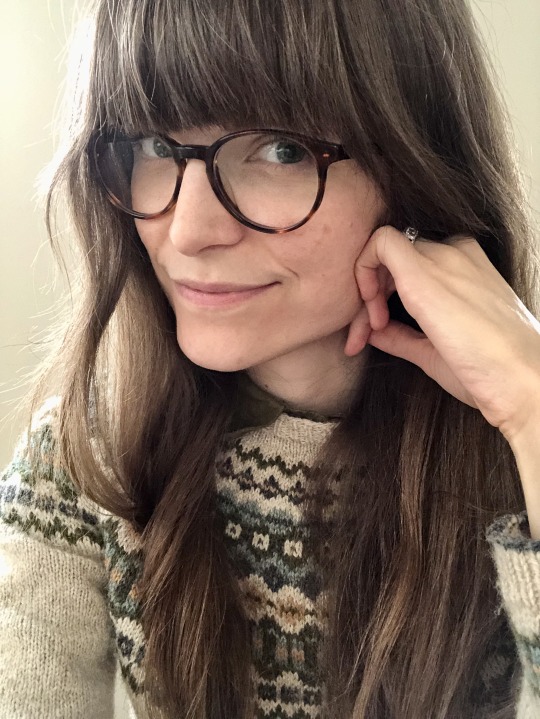
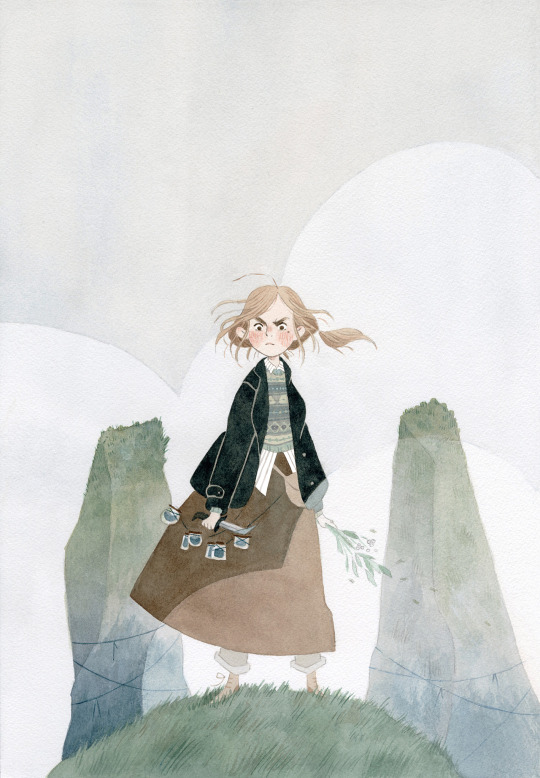
I’m posting the ever-so-rare photo of myself alongside one of my characters based on my childhood because today is World Autism Acceptance Day, and I wanted to show my little corner of the internet who this particular autistic person is:
I was officially diagnosed in February, at age 38 (I’m now 39). A lot of people thought I couldn’t be autistic. Some people who know me in real life still don’t. And until around 10 years ago, I didn’t think I could be either, because I was nothing like the stereotype media portrays. I was told that autistics lacked empathy (untrue), and never played make-believe (also often untrue) and only enjoyed STEM. I was — and am — an empathetic artist -- and make believe? I can spend days sketching finely bedecked bears brewing tea or carefully choosing the right words to weave tapestries of fiction — though perhaps my hyper focus was a bit of a red flag. Even so, how could autism describe me? I was a good student. I got straight A's. I didn’t act out in class. I can make eye contact…if I must. And lots of girls hate having their hair brushed with an unholy passion, right? Clearly I swim in sarcasm like a fish, so autism couldn't be why I was so anxious all the time, could it?
If someone had told me when I was younger what autism ACTUALLY is — instead of the nonsense I’d seen on screens — I would have seen myself in it. I didn’t hear that autistics have sensory issues until I was in my mid-twenties, which is when I first began to really research autism symptoms, and I had almost all of them: sensitivity to light, smells, fabrics, temperatures, textures, and certain touches, all of which make me feel anxious, I fidget (stim), I never know what the hell to do with my hands or where to look, I talk too little or too much, I have special interests, I have entire animated movies memorized shot-by-shot and can remember the first time and place I saw every movie I've ever seen but I often forget what I'm trying to say mid-sentence, I echo movies and tv shows (my husband and I have a whole repertoire of shared echolalias, making up about 20% of our conversations), I was in speech therapy as a kid, I have issues with dysnomia and verbal fluency, I toe-walk, I can't multitask to save my life, I like things just-so, I’m deeply introverted but not shy, I need to recover from all social interaction — even social interaction I enjoy — and I find stupid, every day things like grocery shopping, driving and making appointments overwhelming and intensely stressful, sometimes to the point where I struggle to speak. It turns out, I am definitely autistic. My results weren't borderline. Not even close. And while these aren’t all of my challenges, and not everyone with these symptoms is autistic, it’s definitely something to look into if you present with all of these things at once.
So why did it take me so long to get diagnosed? The same bias that exists in media threads through the medical community as well, and because I'm a woman who can discuss the weather while smiling on cue, few people thought I was worth looking into. Even after I was fairly certain I was autistic, receiving an official diagnosis in the US is unnecessarily difficult and expensive, and in my case, completely uncovered by my insurance. It cost me over $4000, and I could only afford it because my husband makes more money than I do as a freelance illustrator — a job I fell into largely because it didn’t require in-person work; like many autists, I have been chronically underemployed and underpaid, in part due to physical illness in my twenties, which is a topic for another day. But it shouldn’t be like this. It shouldn’t be so hard for adults to receive diagnoses and it shouldn’t be so hard for people to see themselves in this condition to begin with due to misinformation and stereotypes. Like many issues in America, these barriers are even higher for marginalized groups with multiple intersectionalities.
It’s commonly said that if you’ve met one autistic person, you’ve met one autistic person. This is why it’s called a spectrum, not because there’s a linear progression of severity (someone who appears to have low support needs like myself might need more than it seems, and vice versa), but because every autistic person has their own strengths and weaknesses, challenges and experiences, opinions and needs. No two people on the spectrum present in the same way. And that’s a good thing! No way of being autistic is inherently any better than any other, and even if someone on the spectrum struggles with things I don’t — or can do things I can’t — doesn’t make them more or less deserving of respect and human dignity.
But speaking solely for myself, the more I learn about autism, the happier I am to be autistic. I struggle to find words and exert fine motor control, but my deep passion and fixation has made me good at art and storytelling anyway. I find more joy watching dogs and studying leaf shapes on my walks than most people do in an entire day. More often than not, the barriers I’ve faced weren’t due to my autism directly, but due to society being overly rigid about what it considers a valid way of existing. My hope in writing this today is that maybe one person will realize that autism isn’t what they thought — and that being different is not the same as being less than. My hope with my fiction is to give autistic children mirrors with which to see themselves, and everyone else windows through which to see us as we actually are.
If you’re interested in learning more about autism or think you might be autistic, too, I recommend the Autism Self Advocacy Network autisticadvocacy.org and the following books:
What I Mean When I Say I’m Autistic by Annie Kotowicz
We're Not Broken by Eric Garcia
Knowing Why edited by Elizabeth Bartmess
Unmasking Autism by Devon Price, PhD
Loud Hands edited by Julia Bascom
Neurotribes by Steve Silberman
(trigger warning: the last two contain quite a lot of upsetting material involving institutionalized child abuse, but I think it’s important for people to know how often autistic children were — and are — abused simply for being neurodivergent).
Thanks for reading 💛
2K notes
·
View notes
Text

The worsties.... How I love them <3
Illustration of a scene from this fic by @musashi
Let me explain real quick how I got to this fic because it's a little ridiculous and convoluted and I think that's kinda funny.
I'm not a big fanfic guy, generally. I am extraordinarily picky, I didn't get into it as a teen because I had already been blindsided by horny fanart for children's media and did NOT want a repeat of THAT experience (I was devastated to learn that safe search did practically nothing), and tbh all the fanfic websites scared me because I don't like learning new UIs or signing up for things. I just sort of missed the prime window for getting into fanfic as a hobby. Unless something is specifically recommended to me there is a high chance it'll just never cross my path.
Cut to sometime in early November, 2022. I had just recently gotten into Ace Attorney so that I could talk about it with a friend. As I often do, I accidentally became obsessed with it and shot way ahead of where my friend was, ironically making it difficult to discuss it with him. And now I'm drawing a lot of Franziska, and thinking "damn I wish she had a game". Not much longer after I posted some sketches about the concept, I got a notification from @pictureswithboxes. Turns out, she had seen my silly little doodles AND WRITTEN AN ENTIRE COURT CASE BASED ON THE IDEA!!
That story is called Turnabout Substitution, and it's phenomenal. I also have some doodles from that one, but I want to polish them before I share. Anyways, the point is I died on the spot and now, three years later, I've reread the finished story at least 5 times. About a week ago I noticed that there was a new story available, Metal Masquerade. After reading the available chapters I realized that this story has a co-author. Well, I've enjoyed these ones so much, I wonder if this person has any other- OH WOW THAT'S A LOT. Well who do they tend to focus on- FRANZISKA???!? MY BELOVED FRANZISKA VON KARMA!?!?
And that's how we got here :D
Both of these writers have such an exquisite handle on these characters and what makes them interesting, I was genuinely just as entertained by Franziska unraveling a murder case as I was by Phoenix picking up pastries from a café. They're all so full of life, every single scene I've read has been a treat. They're funny, they're dramatic, they're well-paced, introspective, and curious about this fictional world and the people in it. I cannot recommend these authors enough, and I feel genuinely lucky to have found their work
#coffeepaintart#aa#ace attorney art#ace attorney fanart#aa art#aa fanart#phoenix wright#franziska von karma#worsties in law#franny being a lovable menace#ace attorney
237 notes
·
View notes
Note
Honestly it's weird that roleplaying as we know it evolved from historical wargaming.
Like for example DBA rules contain some suggestions for running campaigns with narrative and "propaganda" so I wouldn't say that it's something incompatible, and 0E looks way more like wargames than say PbtA games do, but storytelling games were a feature of artistic salons for way longer and they appear much closer to roleplaying than rulesets for reenacting ancient battles on tabletop.
Salon games didn't have skill checks but neither did wargames and it's strange that nobody came up with simplistic skill checks to add uncertainty and realism to the game
I think the line is a lot clearer when the role of dice and rules in tabletop roleplaying games is correctly understood.
"Uncertainty" and "realism" are, at best, secondary to what the dice are actually doing. Even most tabletop RPGs get it wrong when they try to explain themselves – they'll talk about the rules as something to fall back on to prevent schoolyard arguments (i.e., "yes I did!/no you didn't!") from derailing the story, when in fact it's the exact opposite.
If we look at freeform roleplaying as an illustrative parallel, we see that, while newly formed groups may in fact fall to bickering when a consensus can't be reached about what ought to happen next, mature and well-established groups tend instead to fall prey to excessive consensus-seeking: the impulse to always find an outcome that isn't necessarily one which everybody at the table can be happy with, but at the very least one which everybody at the table can agree is reasonable – and that's a lot more constraining than one might think.
In this sense, the role of picking up the dice isn't to build consensus, but to break it – to allow for the possibility of outcomes which nobody at the table wanted or expected. It's the "well, this is happening now" factor that prevents the table's dynamic from ossifying into endless consensus-seeking about what reasonably ought to happen next.
Looking to the history of wargames, this is precisely the innovation they bring to the table. Early historical wargames tended to be diceless affairs which decided outcomes by deferring to the judgment of a referee or other subject matter expert, but the use of randomisers increasingly came to be favoured because referees would tend to favour the most reasonable course, precluding upsets and rendering the outcomes of entire battles a foregone conclusion. This goes all the way back to the roots of tabletop wargaming – people were literally having "rules versus rulings" arguments two hundred years ago!
(This isn't the only facet of tabletop roleplaying culture which has its roots in wargaming culure, of course. For example, you can draw a direct line from the preoccupation of early tabletop RPGs with punishing the use of out-of-character knowledge to historical wargaming's gentleperson's agreement to refrain from making decisions based on information that one's side's commanders couldn't possibly have possessed when re-creating historical battles.)
To be clear, I don't necessarily disagree that salon games could have yielded something like modern tabletop RPGs. However, first they'd have had to arrive at the paired insights that a. excessive consensus-seeking is poison to building an interesting narrative; and b. randomisers can be used to force the breaking of consensus, and historical wargames had a substantial head start because they'd figured all that out a century earlier.
1K notes
·
View notes
Text
Do you see the vision?

Trophy wife Claire this, supermodel Claire that, I think an older Claire would be a snippy CEO who wears a hot pink suit like Elle Woods.
#(May or may not be based on one of my favorite outfits in real life 🤭)#my art#Beetlejuice#beetlejuice animated#beetlejuice cartoon#beetlejuice fanart#procreate#claire brewster#clairelyds#claire brewster x lydia deetz#claire x lydia#Ignore the sudden jump from having a flat chest to suddenly having tatas#I didn’t realize until it was too late and I wasn’t sure how to fix it…#so I’ll just accept it.#But gosh— I have recently been in love with brainstorming Clairelyds in the future#I think they’d start a business together- since Claire’s parents likely have a background in business just like Lydia’s#I’m not entirely sure what that business would be yet#Perhaps they’d start a magazine or fashion company with Lydia as the director for photography and design while Claire markets and supervise#Just imagine the cute little day-to-day wifey/coworker stuff! Lil kisses- lunchtime gossip- collaboration on projects… too good!#I love it I LOVE IT#And I wonder too how they would combine or at least balance out their different aesthetics#GAHH it’s too perfect! Too inspiring!#Forgive me for my obsession— yet I can’t find it in me to apologize!#It’s everything I love! Women in suits- girl bosses- and we can’t forget the wives!#I meant to have a picture of an older Lydia here to- but I simply didn’t get it done this round#(I might make an illustration for her too— if you ask very nicely)
49 notes
·
View notes
Text
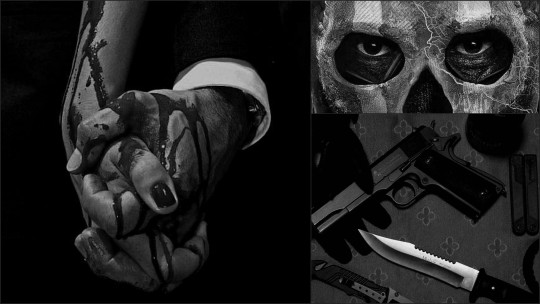
I Never Missed You 1/3 (Bodyguard!Ghost x F!Reader)
Word count: 3.5 k
Tags/warnings: 18+ only. Romance, eventual smut, fluff, light angst, banter, pining, flirting, minor injuries, major character death, HFN ending. Lady/Knight dynamic. Unequal pairing trope. Bodyguard AU. Reader is a rich bitch (how else could she afford a PPO?)
Summary: 1/3 You hire a bodyguard to protect you and hunt down the one who's been sent to take your life. This man was your lawyer's first recommendation, and you never even looked through his file because you had better things to do. But it soon turns out that this man – this Simon Riley – is very talented... Talented in driving you crazy.
A/N: A three part fic based on this request. The first chapter features banter and pining. If you're here for smut, stay tuned. There is an entire chapter of it coming right up.
Your lawyer says it would be a good idea. He even dares to look at you from under his brow like you're a child who doesn't know what's good for her.
And you don't.
Because that's exactly how you feel like: a grown woman who's stunted to a kid, now being supervised by adults.
The bodyguard they assigned you - the one you accepted because he was your lawyer's first choice - is exactly the broad, brooding type you have always imagined bodyguards to be like.
But he's not wearing sunglasses, and he's not wearing a suit. He says the point of a bodyguard is that they don't look like a bodyguard.
The first thing you actually pay attention to is the milky-white eyelashes. Only days after you hear that this man rarely shows his face. You were given a file on him, but you never peeked inside it because you were pissed that such drastic measures had to be taken in the first place. You just happened to be in the wrong place at the wrong time.
Now you pry it from the pile of papers you buried it into, open it, and the first - and only - photo you see is a perfect portrayal of what Death looks like.
He's the Reaper himself when adorned with that human skull. Keen but emotionless eyes stare from the pits of the sockets to somewhere in the distance, but that look is a stare into the past. The photo raises thousands of questions, and not only the need to know why this man prefers to wear human bones when he's shooting people.
Because apparently, that’s what he used to do before he became a bodyguard. He's buff, that you already know. But in that picture, he looks even more packed, with what you suppose is a bullet vest beneath that blouse. He’s holding an ugly-looking gun – not a pistol, but a rifle of some sort. The gear on him no doubt weighs something close to 60 pounds. His sleeves are rolled up and expose the crisscross veins on his forearms along with war-ugly, crude tattoos, and you swallow.
Were you really looking at a picture of a barbaric soldier like it was some peculiar soft porn now?
You flip the file closed and toss it on the table, rather disgusted with yourself.
The next time you see him, you look into those brown eyes a moment longer. That stoic stare is the only thing you recognize as that of the man in the picture. That, along with his size, although photos really can't convey how this brooding grunt makes you feel: small and insignificant. Nor do they illustrate how the man looks like he’s the most graceful bull in a china shop when moving inside your house.
You suppose he grew up poor, the way he looks at your furniture, your half-a-mile bookshelf, and the latest art piece you got last month in your living room. He's judging you.
You're posh. And clueless. And a child.
And this brute lives with you, for now. He's placed downstairs until the target is neutralized. And he's not just a bodyguard: he's hunting the hunter while you're the bait.
It should give you a thrill; your friend giggles when you two gossip about him over a lunch while he's standing only a few feet away. But this situation does not give you a thrill. It just makes you pissed.
And it's not just the situation, it's this... Simon Riley who makes you pissed.
Couldn't they teach manners, some conversation skills at the bodyguard school or wherever the hell this pale, emotionless Hulk came from?
You recheck his file and snoop some more details about his past. He didn't go to bodyguard school (of course he didn't); he used to work for some PMC. The brute's a cold-blooded, cold-hearted mercenary. To put it more eloquently, he's an elite soldier of some tactical unit. But all of that is classified, as is almost every other detail about him. The only thing you are left with is that he's British through and through, but you can already tell that by his accent - the thick Mancunian that makes your stomach and heart flip.
It's gruff – of course it's gruff – and sometimes chafes your ears like they were being grated with the softest grater. You find yourself thinking about him while you're in the shower, when your fingers start to drift and wander.
And for the love of god, you are not thinking about that accent and those eyes while you're masturbating. You're not going to mourn the fact that he never rolls his sleeves when he's with you. When he's at work.
"I saw your file," you start to chitchat over breakfast one day.
"I reckon."
He won't even touch the coffee you poured him but proceeds to drink almost all the tea. The delicate china looks miniature in his hands as he pours the Earl Grey into his cup. The cups are dainty, too – this savage would prefer a large, black mug, perhaps, from which to gulp his tea.
"So. What made you become a soldier?"
"Joined the SAS when I was 17."
And another thing he won't do is look at you when you speak. No manners at all in this man, only rough, sharp edges. He sits as far from you as he can, at the other end of the table, as if you were in a meeting. Or a war council.
"That's not what I asked."
"I know."
You roll your eyes. Conversation skills, god. Just give this man at least some charm…
"I'm going to do some shopping," you declare. "You can stay here."
Finally, he raises his stare. It's full of tired distaste.
"Nah. That's not how this works."
You rise from the table, gracefully and with a neutral face, indicating that you are an adult and won't be needing a babysitter at a store.
"Lady."
The command is dark and stops you before you have taken one step from the table. It's a slur, almost.
He rises from the table too, and you almost feel sorry, noticing he hasn't yet finished his toast.
"You hired me. And I'm gonna do my job."
He looks big and broad, like a beautiful storm, with that piercing stare and the most alluring lashes you have ever seen on a man. Your voice turns into a meek, pitched attempt to reason with a giant.
"...I'm just going shopping."
His head tilts with a mock: you're only a child in his eyes.
"Then let's go shopping."
…......…......
Sitting next to this giant in a taxi must be a hilarious-looking scene. A charming, vibrant lady and a sullen, intimidating Theseus – what a pair.
You've also never been this close to him. The man always sits with a wide spread. One heavy thigh almost touches your knees, which you have turned towards him for some unfathomable reason. You were taught to sit with knees closely set together, and that’s what you’re trying to do now: make yourself as small and feminine as possible. It only accentuates this man's size compared to yours. There's a pile of shopping bags between you two, and your gaze is directed outside the window, but you can feel his presence like there's a thrumming monolith beside you.
And he's always dressed in black. You kind of enjoyed how you two looked at the store: you in your heels and a pearl white suit, he in black, tactical ripstop and boots. You wouldn't define the man well-dressed… but he is sharply dressed in his own field, that's for sure. Even a commoner like you could see that.
He had complained about your clothes. White draws too much attention and makes for a bigger target. You had brushed him off with a scoff. You’re not going to change the way you dress because of this.
"You're from Manchester, right?"
You're only trying to make the journey home more enjoyable, but feel like you're snooping again, this time from the man himself. The less you know about Simon Riley, the more you want to learn who he is. It is only natural to get a little curious when his file barely had two paragraphs and a photo. You suppose even that single picture was taken and given forward with reluctance.
And the only thing you learn is that small talk is a completely foreign concept to this man.
"You're quite the Sherlock," he mutters with that fat accent that gave him away the minute you two shook hands. You Sherlock about some more, look at the left hand that rests on his thigh.
There's no ring. Not even a tan line. He must be lonely: no relationship could stand working hours like these.
"Do you still live there?"
"...No."
"Do you miss the place?"
"No."
The short answers are guttural and spoken from the back of his throat. You don't know if he's doing it on purpose, or if this Simon is like this with everyone. He's not annoyed, though, not the way you're beginning to be.
"Aren't you a chatty one…" you mumble while watching cloudy London pass by. You figured he might hear it, and perhaps that was your purpose, even if your voice was barely a whisper.
"I'm not here to talk. Ma'am."
…......…......
You are told to stay away from the windows. The dinner table is moved so no one can aim at your head through a glass. And even then, most curtains must be closed at all times.
He goes through doors first, and advises against going out at all. You get a list of things you should take into consideration if you do go out.
And you’re not going to give in to fear.
You simply take different routes to your friends and family, have lunches at different restaurants than usual. He says you should get an armored car, but you don’t have a license. Of course your brooding bodyguard could drive, but what will you do with some armored tank after you're finally through this thing?
What's far more interesting is that it turns out this Simon Riley is a smoker.
Disgusting, you think at first, then think about him all sweaty and grimy after some gunfight, reaching for a cig, curling those thick fingers around a pure-white coffin nail. No, wait – he had gloves in that picture; he wouldn't bother to take them off before he smoked, he would just lean on his gun and on some crumbling wall and sigh from the joy of being alive, of being bloodied and dirty and victorious before taking a long drag from his cigarette.
Ugh.
Reluctantly you agree that perhaps there is an odd charm to this man after all. Either that, or then you are in need of some serious therapy.
Breakfasts are torturingly quiet with Simon, and you can hear the slow roll of eyes every time you make plans to go to a party or an art gallery.
Once, a zipper gets stuck and you have to ask him for help. It’s mortifying, and he doesn’t say a word, only mocks you with his eyes as you turn around for him to place a warm hand on your hip and another on your back to pull up the zipper you had fought to reach and drag up by yourself for at least 10 minutes.
A week passes, and he’s buried in work, not only because he’s guarding your body 24/7, but because he’s trying to locate the hitman. The fact that Simon Riley is technically speaking a hitman too - to think that you have hired a killer - is something you don’t have the mental strength to delve into right now.
"Found the one who's hunting you."
Another file is dropped before you at the end of the week. The man marches into your office like there's no door there at all. Doesn't even bother to knock.
This isn't what you meant when you politely told him to make himself home…
You roll the glass of water on your temple and sigh. The file reveals another photo, this time of a man who looks like an executioner.
"Goes by the name König," he says and clasps his hands over his crotch while taking a wide stance in front of your desk. "Austrian war criminal. Skilled with knives… Likes to torture people first."
Nice. More brutes.
"Why are you telling me this?"
You're tired, there's a headache approaching, and you really don't care to go over some details about a professional lunatic killer right now. But Simon Riley - codenamed Ghost, you’ve lately learned - looks down at you like a storm cloud over a carefree meadow.
"Because you clearly don't understand the danger you're in."
He adds "Ma'am" as a footnote. Purposely forgotten...
And you wish he would forget that silly, overly courteous term.
"Well–" you sigh your frustration in the air between you two, then realize that perhaps you're being treated like a child because you behave like one. "What are you going to do about this man...?"
"Gonna kill him," he simply shrugs, the eternal, distant look in those eyes gaining a smug tone to them.
He enjoys this. Enjoys killing, but what's even worse, enjoys seeing how his ruthlessness makes you shift uncomfortably in your chair. Or perhaps he just likes shocking you with that file with an image of a lyncher in it. You know perfectly well that you're in trouble and under threat. That's what you've tried to forget, but no one lets you forget.
Simon takes a deep breath before placing his humble petition before you.
"Ma’am. I'm gonna need your help."
And nothing in this man is humble. Even though he rarely speaks and never shows his talents, not to talk of showing off, he reeks of pride and testosterone.
You set the glass on the table and straighten the file to align with the leather pad on your desk. Your fingers are not trembling. Yet.
"What do you mean?"
He gives a hoarse laugh. The sound drills straight to your core and starts to bloom there. You realize you have never seen him smile before. And he's not smiling now: the short laugh is just a dark chuckle that mainly stays inside his chest; it only makes those stocky shoulders rise and fall.
"Not like that," he looks down at you with a tad of mercy. "You're gonna serve as bait."
"Isn't… that what I've been the whole time?"
"Yeah. But this time, we're gonna lure him in."
The way he talks makes your thighs rub together without your consent. You wonder what it would feel like if you were trapped between that solid chest and a wall, what it would be like if those hands woke you up with a calloused caress of a thigh.
You don't quite understand the difference between bait and a lure but find yourself willing to do whatever you can to help him. Help Simon…
"Sure... I'll help you," you say as if this man wasn't on your payroll.
"That's the least you could do."
That barely hidden bite in his dry retort doesn't escape you. This man's audacity buries whatever odd want you have started to feel for him and replaces it with searing, womanly fury.
He could be a little more sensitive.
You're the one who has a target on their back. You're the one who fears going to sleep at night and feels lucky they're alive come dawn. If he wasn't so crude and uncaring, you would've asked him to sleep in the same room with you from the start. But he has to be a brute, has to follow and mock you with those ink blot eyes at every turn.
You rise from the chair when he turns and walks toward the door. It's almost a snappy jump, an attempt to reclaim your power. You're sore and thoroughly peeved.
"I never wanted this," you tell him with an annoying timbre in your tone. He stops right before the door but doesn't turn.
"Neither did I."
"Really?"
"Yeah. Could be somewhere warmer with no damsels giving me their cheek."
The BDU blouse you saw in that picture was yellow, burnt yellow. Desert wear… He wants to be in a hot desert with a cold gun in his hand. Dropped straight from some plane, working alone, in a place where damsels aren't giving him their cheek. Where there are no damsels at all.
You're relatively sure there is no Mrs. Riley. No woman could stand this man.
"Then go somewhere warmer," you snap, almost stomp your heel on the soft carpet. This man is simply intolerable. The way he never reacts to anything makes you want to throw things at him.
He must be trained to be so calm, but you're not. You're used to making men a little stupid and flustered. You're used to men eating out of your hand. He's not behaving at all like he's supposed to. Simon Riley is just a mountain without emotion.
He turns with that eternal, downgrading look in his eyes. There's a flash of amusement there, too.
Soddy bastard…
"Nah. Not until I've done my job."
His voice is warm now; the gruff and gravel make way to a smoothness that goes directly to your knees. Your lips part, and his eyes fall on your mouth just before he lifts his chin a hair of an inch.
"Your job…" you breathe, too furious to even rage or shout.
Your fucking job.
Why did you even want this job if it's so–
"Yeah. My job. Some people got one."
You have to take support from the table with your fingertips.
"Excuse me?"
There's the tiniest curve at the corner of his mouth before he takes his leave.
"Good night, ma'am."
…......…......
The next day, you start the breakfast by apologizing.
You barely slept that night, first because of this man's utter nerve, then because your wrath eventually cooled down into a bleeding consciousness of how you must look in his eyes.
He has accepted this job, something different from what he usually does, for reasons unknown to you. He might not be on some faraway battlefield where bullets fly past, but this is no less risky. The picture he showed you, the file on König, haunted your restless sleep last night – when you finally did get some sleep.
You have been running around like everything’s normal when it’s not. The man’s just trying to do his job.
And you're the one who hired him. Not your lawyer.
"I want to make peace," you coo while spreading some jam on toast. You expect Simon to finally melt a little. You might even get a smile. You secretly hope your reward is that this brute turns into a tamed lap dog you can feed some treats every now and then.
The situation is thrilling: the beefiest man you have ever seen is going to kill someone for you. Even if he's being paid to do so, he is prepared to die for you. There's something incredibly sexy about that.
But there is silence at the other end of the table. Only the crunchy sounds of toast getting sugar on top can be heard.
"That so?"
He doesn't sound like he's melting. He doesn't sound at all domesticated. He only sounds more and more amused.
"Yes. I'm happy that you're here," you put the toast down and turn to look at him with angel eyes.
He laughs. When he stops, he looks you up and down, then laughs some more, a silent, shoulder-shaking chuckle.
"I'm… I'm serious," you hurry to add. "I mean it. I haven't been treating you the way I should–"
"That's for sure."
You see more warmth in those eyes. But it's not because of your humble apology.
His eyes are trekking down the neckline of your blouse, and to your horror, you notice – feel – how one of the top buttons has opened, revealing much more than just some skin. You're pretty sure he gets an ample view of the fuchsia bra you're wearing underneath.
If you reach for that button now, you underline that he's not supposed to look, even if it's your mistake that you're so obscenely exposed. If you close it now, you tell him he's not allowed to look. And that's not entirely true.
"Will you forgive me?"
You feel like you're offering peace, or at least a truce, with more than just that peepy question. Because your breasts swell inside that blouse. They rise and fall with your breaths, your nipples grow hard from that look that stays down a bit longer before drifting back up.
"There's nothing to forgive," he says, voice dropping a note or two.
"Good," you swallow. The following sentence comes out so weakly that it's almost a whisper. "After all, I hired you."
"Ain't that the truth."
The dim glint in those eyes still holds you as a prisoner, and his tea is growing cold.
"Are we going shopping today?"
"No," you utter, dreading the next inevitable question.
"What then?"
"I… I have a yoga class."
"Of course you do."
…......…......
Taglist: @cumikering
#ghost x reader#simon riley x reader#simon riley imagine#ghost x you#simon ghost riley#simon ghost x reader#simon ghost riley x reader#simon riley x you#ghost smut#simon riley smut#cod fanfic#mw2 fanfic#simon riley fanfic#simon riley x female reader#ghost x female reader#bodyguard au#bodyguard!Ghost
3K notes
·
View notes
Text
These motherfuckers did it from the start
The entire time I've been listening to Magnus Protocol and reading all the theories and understanding what is going on, there's been some ideas that just haven't been convincing. Either because they're based on the Archives entities or the theories exist because of misinterpretation and some are more convincing than others but finally I understand. I don't think I'm right, I don't think everyone else is wrong, but I think I understand.
Because the thing that cracks everything is Mister fucking Bonzo
FIRST OF ALL
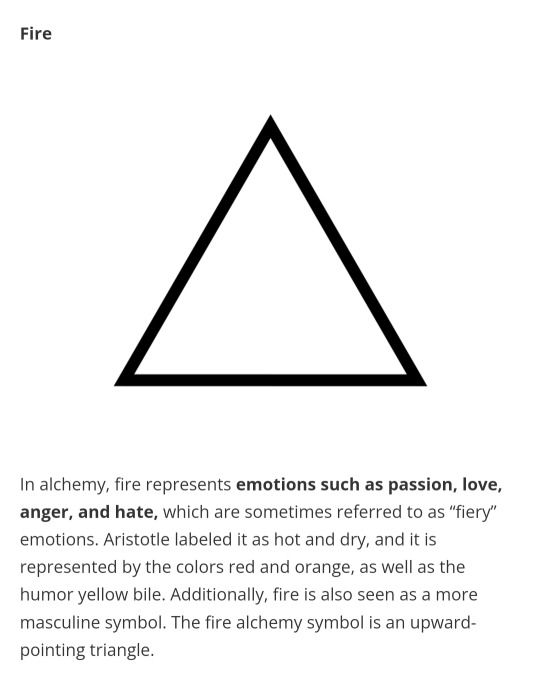
One of the four base elements, Fire, associated with the colors red and orange and the humor yellow bile. Well what are the humors?

Blood, Phlegm, Yellow Bile, and Black Bile.
Yellow Bile, which is associated with Fire in alchemy, provokes excitement. Just like we see when Bonzo attacks, there's an excited chanting of his theme song. But as we just saw recently, Bonzo can get very angry, seemingly jealous of the murderer on trial.
But it's even worse than that
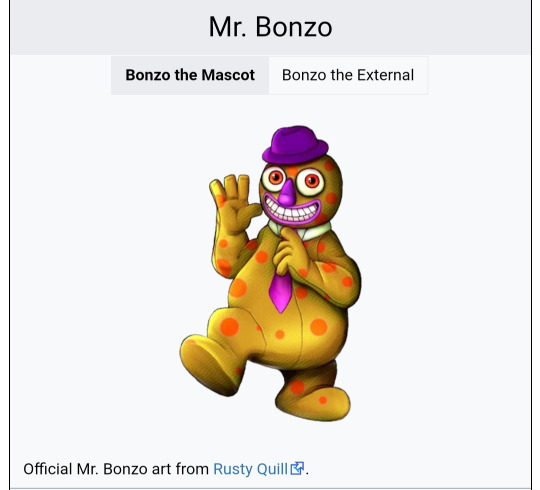
MR BONZO IS ORANGE AND RED
Yes I know this is more yellow and orange, but remember ancient colors were different and depending on where you were located and at what point in history, the names for colors were different (I tried to find an illustration to help prove my point but unfortunately I couldn't find a good one and I'm losing my mind right now so I stopped looking)
BUT IT GOES DEEPER
Because in alchemy, Air is sometimes thought of as a life-giving force and is associated with Blood. Blood is thought to promote joy and mirth and enthusiasm. Remember Needles? We loved that little guy, the most enthusiastic and joyful murderer in the series. Just like how in real life, needles can draw Blood and are used in vaccines which are Life Saving devices.
But it gets worse still
Because Air is symbolized as the Earth symbol inverted. Earth being cold and dry, representing physical movements and sensations and associated with Black Bile. Black Bile being melancholic and withdrawn, just like Ink5oul. Ink5oul the tattoo artist. The tattoo artist that uses NEEDLES
Earth and Air are just inverses!
THERE'S EVEN A FUCKING EPISODE WHERE A SENTIMENTAL COUPLE GOES TO FIND THEIR LOCK THEY PUT THERE YEARS AGO AND STUMBLE INTO A LOCK MUSEUM WHERE ONE OF THEM DROWN. Sentimentality is associated with Phlegm and you know what Phlegm is represented by in alchemy? WATER!
From the start, it's literally been from the start. There's so much more, alchemy is becoming my life, there's so much, they're doing it again, from the first fucking episode it's all been here.
#the magnus protocol#tmagp#the magnus archives#tmagp spoilers#tma#the magnus protocol spoilers#the Magnus archives spoilers#tma spoilers#I am literally so obsessed with alchemy and I cannot stop
190 notes
·
View notes
Text
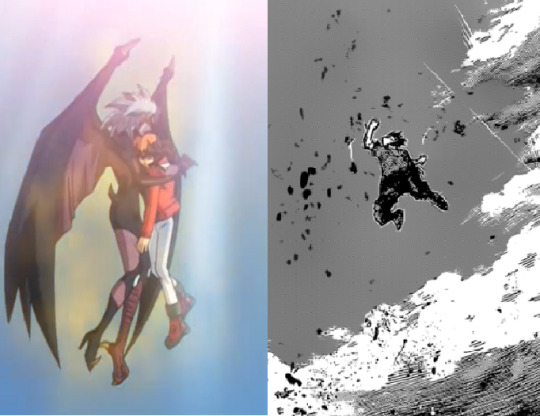
SHIGARAKI VS. YUBEL: HOW TO SAVE YOUR VILLAIN
The failure of Deku to save Shigaraki isn’t just a tragic conclusion for Shigaraki’s arc, it’s also My Hero Academia failing as a story. When I say the story failed, I mean the story has failed to answer any of the questions it asked its audience. It’s themes, character arcs, everything that communicates the meaning of the story to the audience is no longer clear.
Saving Shigaraki was the central goal of not only the story itself, but the main character Deku. By failing in its goal you can’t call this a good ending. In order to illustrate why this goal of saving the villain is so important to both Deku’s character and the central idea of MHA, I’m going to provide a positive example in Yu-Gi-Oh GX were the main character Judai successfully saves their villain. One of these stories fails, and the other succeeds. I will illustrate why under the cut.
BROKEN THEMES = BROKEN STORY
When artists draw they have to consider things like perspective, anatomy, shading, light, coloring. Drawing has rules, and it’s hard to produce good art without knowing these rules beforehand. If I draw something that has bad anatomy, you can criticize me for that.
Writing has rules, just like drawing. The rules of storytelling are important because writing is an act of communication. You can write whatever you want, just like how you can draw whatever you want, but if you break the rules the audience won’t understand what you are trying to communicate.
When I refer to MHA as a broken story, I am referring to the fact that it has broken the rules of storytelling. As this youtuber explains.
“I guess we should first define what broke and broken even means in this context. Has the story turned into an unintelligible mess? Not really. Value judgements aside, the narrative is still functional and fulfills the criteria of being a story. So how can a story that still functions be broken? Maybe to you it cannot. But to me a story that is still functional isn’t enough. What I mean when I say MHA is broken is that it’s lost something crucial. A codifying style of structure, pacing and payoff that until a certain point was the core of its identity.”
I could launch into a long-winded explanation of what themes are, but for the sake of simplicity I like to define themes in terms of “Ask, and answer.” The author asks a question to the audience, and then by the end of the story provides an answer. The audience is also invited to come up with their own answer which prompts them to think about the story on a deeper level. The question both MHA and GX are asking both its main characters and the audience is “Can you save the villain?” with the additional complicated question of “Should you save the villain?” This post will detail how both stories go about answering those two questions, and more importantly why those answers matter for the story.
With Great Power… You know the rest.
My Hero Academia and Yu-Gi-Oh Gx are actually similar stories once you get past their superficial differences. MHA is a story with way better worldbuilding, compared to a society where everything revolves around the trading card game, and people go to school to be better at a trading card game.
However, if you get past that. They are both bildungsroman, stories about the main characters growing up into adults. They both have an academy setting where the goal is for the main character to graduate and enter the adult world. They are both shonen manga. GX is the sequel of Yu-Gi-Oh a manga that ran in Shonen Jump the exact same magazine as MHA. The biggest point of comparison is their main characters, who both start out as young and naive who are driven by their admiration of heroes. Deku is a fan of All Might who wants to become a hero despite not having a quirk, because he loves All might who saves everyone with a smile. Judai’s entire deck archetype revolves around “Elemental Heroes’ and later “Neo-Spacians” who are all based on popular sentai heroes like ultraman.
The central arc for both characters is to grow up. Growing up for both of them not only requires figuring out what kind of adult they want to be, but also what kind of hero they want to be.
Now I’m going to drastically oversimplify what a character arc is.
A character arc first starts out with the character being wrong. Being wrong is essential because if the character is right from the beginning, then there’s no point in telling the story. A character often holds the wrong idea about the world, or has some sort of flaw that hinders their growth. The narrative then needs to challenge them on that flaw. It usually sets up some kind of goal or win condition. That flaw gets in the way of a character “winning” or achieving their goal, so they need to fix that flaw first. If their ideals are wrong, then they need to think about what the right ideals are. If they’re too childish, they need to grow up. If they have unhealthy behaviors or coping mechanisms, they need to unlearn it and require better ones. Otherwise, that flaw will keep sabotaging them until the end.
I’m borrowing the word “win condition” from class1akids here because it’s an incredibly appropriate terminology. Midoriya needs to do “x” in order to win, otherwise this victory doesn’t feel earned. The “x” in this case is usually character development. As I said before, a story where the main character hasn’t changed from beginning to end feels pointless. Especially in Deku’s case, he was already a brave, strong hero who would charge right into battle and defeat the bad guys in chapter one, so him defeating Shigaraki in a fist fight doesn’t represent a change.
The story sets up not only “What does the hero need to do to win?” but also “How does the hero need to change in order to win?” A character either meets these requirements before the end of the story, or they don’t and usually this results in a negative ending.
MHA in its first half quite clearly set up both the final conflict of saving the villains, and also that saving the villains is its “win conditions.” The hero shouldn't be allowed to win without first fixing this flaw.
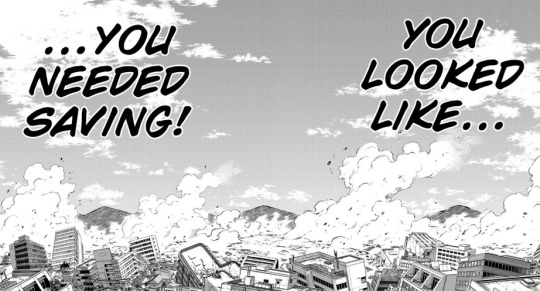
From this panel onward the central question Deku is forced to answer shifts from “Am I strong enough to defeat ShigarakI” to “Can I save Shigaraki?” However, much earlier than that All Might goes on to basically set up the win conditions of what makes the ultimate hero as someone who “Saves by winning, and wins by saving.”
All might: You can become the ultimate heroes. Ones who save by winning, and win by saving.
Therefore the story has set it’s criteria for what kind of hero Deku needs to become. If he wins without saving, then he’s failed to become what the series has set up as the Ultimate Hero.
Shigaraki and Yubel aren’t just narrative obstacles, or boss monsters to be killed like in a video game. They are narrative challenges, which means that the character can’t grow in any way if they don’t answer the challenge presented by the characters. They are villains who actively resist being saved, to provide a challenge for two heroes who define their heroism by saving others. The challenge they pose adds a third question to the story and the main characters.
"Can I save the villain?"
"Should I save the villain?"
"If I don't save the villain, then can I really call myself a hero?"
In other words the decision they make in saving, or not saving their final antagonist defines what kind of hero they are. In Deku’s case it’s even more critical he defines what hero he wants to be because the MHA is also a generational story, and several of the kids are asked to prove how exactly this generation of heroes is going to surpass the last one. The kids growing physically stronger than the last generation isn’t a satisfactory answer, Deku getting strong enough to punch Shigaraki hard is not a satisfactory answer, because we are reading a story and not watching a boxing match.
I’m going to focus on the last two questions though for a moment. Many people who argue against saving villains like Shigaraki argue he is a mass murderer and therefore isn’t worthy of salvation. However, the act of saving Shigaraki isn’t a reflection of Shigaraki himself, but rather the kind of hero Deku wants to be. It all boils down to Spiderman. In the opening issue of Spiderman, teenage Peter Parker is bitten by a radioactive spider and suddenly gains super strength, the ability to stick to walls along with other powers. However, being a teenager he uses these powers selfishly at first. He doesn’t feel the obligation to use his powers for other people, and therefore when he sees a robbery happening right in front of him he lets the robber go. However, because he lets the robber go, the robber then attempts to hijack a car and kills his Uncle Ben in the process. If Spiderman had stopped the robber then he might have prevented that from happening. He had the power to stop the robber, but he didn’t feel responsible or obligated to save other people. As a result Uncle Ben dies. It’s not enough to have power, ti’s how you use that power that reflects who you are, therefore: “with great power comes great responsibility.”
The choice to save Shigaraki actually has little to do with whether or not Shigaraki is redeemable, but rather how Deku chooses to use his power, and what he thinks he is responsible for reflects who Deku is as a person. Deku himself also clearly outlines how he wants to use his power, that One for All is a power for saving, and not killing.
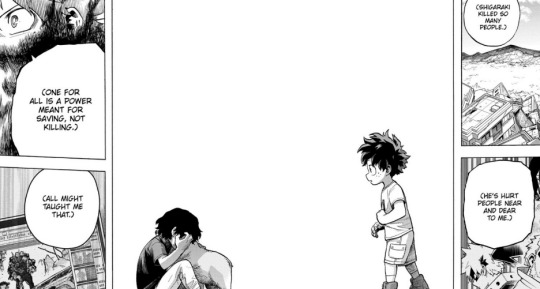
How he uses his power reflects Deku’s ideal in saving others, and therefore if he doesnt use his power to save, then he’s failed to live up to his ideals. It's not whether it's morally right to save a murderer like Shigaraki, but rather the way Deku wants to choose to use his power. It's about whether he feels the responsibility to save others.
Judai explores an incredibly similar arc to Deku. They are basically both asked what kind of responsibilities a hero is supposed to have, which is also a metaphor for growing up to handle the responsibilities of adulthood. As both characters start out with incredibly naive and childish ideas about what a hero is. Therefore realizing what a hero is responsible for is key to them growing as a character. However, Judai is different from Deku. In some ways he’s more like Bakugo. Judai is a prodigy who’s naturally good at dueling. He doesn’t duel to save others, but rather because duels are fun and he’s good at it. He’s very much like Bakugo, who admired All Might as a hero just as much as Deku did, but admired the fact that he was strong and always won rather than he saved others.
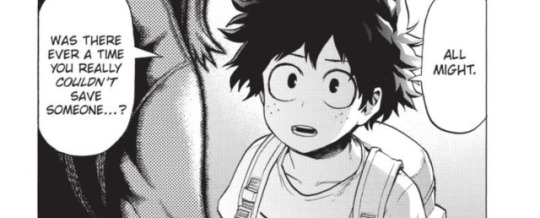
However, I would say both Deku and Judai are questioning what a hero is responsible for. They are both asking if they have the responsibility to use their power to save others. If they have to fight for other people, just because they have power. His first big challenge as a character comes from Edo Phoenix, who calls out Judai for not thinking through what it means to be a hero, and what responsibilities heroes carry. Judai duels because he thinks it’s fun. He will show up to duel to help his friends, but that’s because he’s the most powerful person in the group. Even then it’s because he finds fighting strong opponents to be enjoyable. Bakugo will beat up a villain, but for him it’s more about winning then if the action will save someone or not.
Judai is more often than not pushed into the role of being a hero, he doesn’t play the hero because he’s a particularly selfless person, and he’ll often avoid responsibility if not forced. He has power but no sense of responsibility and the narrative calls them out as a problem.
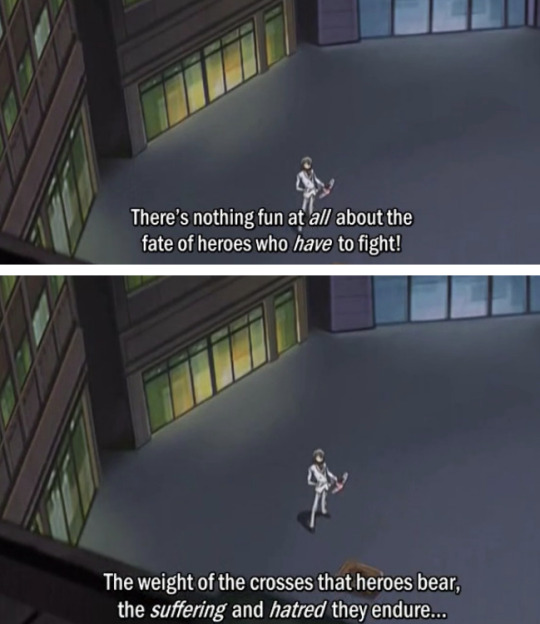
Edo: Can you even fathom that, Judai?
For Judai, he can’t understand the responsibility of being a hero. For Deku, he idealizes heroes so much he can’t understand that there are people out there the heroes have failed to save. These two callouts towards Deku and Judai are discussing similar because they’re both discussing where a hero’s responsibilities lie. Is a hero responsible for saving everyone? Is someone strong like Judai responsible for using their strength to help other people?
Judai’s arc continues into the third season where he’s not shown to just be naive but ignorant. He’s not just childish, he actively resists growing up because he doesn’t want to take on adult responsibilities.
THe same way that Deku just decides not to think about whether or not All Might failed to save people in the panels above. However, in Judai's case he's actively called out for his choice to remain ignorant.
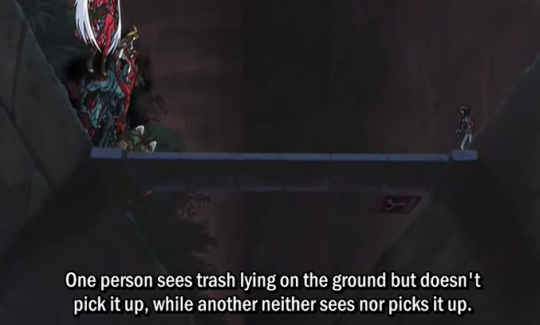
Satou: Now, which one is at fault? Judai: Isn’t it the guy who saw it, but didn’t pick it up. Satou: Not quite. If one is aware of the trash that fell, it may be picked up someday. But there is no possibility fo the unaware one ever picking it up. Judai-kun you are the foolish one unaware of the trash that has fallen. Judai: Are you calling me out for how I am? Satou: Your behavior towards me was atrocious. The worst was attending class only for credit, even if you were there you only slept. Judai: Yeah, I know. I was all bad, but it wasn’t that big a- Satou: It is important. You see, one by one, the students inspired by your attitude were losing their motivation. Now if you were a mediocre duelist, then this would not be an issue. Satou: However, you are the same hero who defeated the three mythic demons. Every single student in the academy admires you. You should have been a model for this academy. Judai: Me, a role model? Are you kidding? I just do whatever I feel like doing. Satou: Great power comes with great responsibility. Yet, as you remain unaware of that, you’ve spread your lethargy and self-indulgence.
seems like a minor issue, but look how Judai responds to the accusations. “I just do whatever I feel like doing.” Satou is arguing that Judai should pay attention to the influence he has on others because of his power, because how he chooses to use that power affects others. However, Judai chooses to actively not look at the consequences of his actions because he doesn’t want to take on that level of responsibility, and therefore he’s looking away from the trash.
While it seems like it doesn’t matter in Satou’s specific example, not thinking of the consequences, or how you use your power can have unexpected consequences. Spiderman doesn’t feel like it’s his responsibility to stop a bank robber, and that bank robber shoots his uncle. You could still argue it’s not Spiderman’s responsibility to stop every crime in the world, and I guess no one owes anyone anything from that point of view - but Spiderman failing to act responsibility had the consequence of directly hurting someone else.
Spiderman has to live with that consequence because it was his own Uncle that was hurt. This is where we really reach the duality of Judai.
In GX, Judai is, symbolically speaking, The Fool of the Tarot Deck, the Novice Alchemist — a person brimming with infinite potential, yet one who is also supremely ignorant, who walks forward with his eyes closed and often unknowingly causes harm in his great ignorance. In this, he is very much the embodiment of the faults we most commonly associate with teenagers — selfishness, recklessness, shallowness, a lack of dedication or empathy when it’s most needed. Like most people, he has good traits that work to balance out some of the above, but his narrative path through GX ends up being that of the flawed hero undone by his faults — and then that of the atoner, the repentant sinner. In his case, the mistakes of his teenage years are the catalyst for his growth from a boy into a man burdened with duty and purpose. Judai is someone with infinite potential, with great power, but also ignorant on how he should use that power, and that makes him an incredibly flawed hero who needs to learn how that power should be used.
Deku similarly exists in a society where heroes deliberately turn a blind eye to the suffering of a certain type of victim. Shigaraki’s speech heavily resmebles Satou’s speech about garbage on the side of the road.
Shigarali: "For generations you pretended not to see those you coudln't protect and swept their pain under the rug. It's tainted everything you've built."
Deku shares Judai’s ignorance, because he’s not only a part of a system that doesn’t even see trash on the side of the road, but he also worships heroes so much that he’s incapable of criticizing them. If Deku saw the flaws of heroes, but at first didn’t have the courage to speak out, but eventually gained the courage that would be one thing. However, if he doesn’t see the flaws of heroes, then the problem will never be fixed.
There are also consequences for both Judai and Deku failing to use their powers responsibly. These consequences take the form of the villains who came about because of all of society’s ignorance to the suffering of victims (Shigaraki) and because of the main character’s ignorance to their suffering (Yubel). Shigaraki and Yubel are also explicitly victims that the heroes failed to save, turned into villains who are active threats to the heroes.
Should I save the villain?
The answer is yes, because the decision to save is reflective of the kind of hero each character wants to be. Each story clearly sets up that Deku and Judai aren’t punisher style heroes who shoot their villains, they are being set up as heroes who save. Deku needs to “save by winning.” As for Judai, a big deal is made of Judai’s admiration for another character Johan who represents a more idealistic kind of hero. Johan unlike Judai is someone who duels with a purpose, something Judai outright says he admires because he’s empty in comparison.
Judai: Johan what have you been dueling for? See, it’s about fun for me… Well, for the surprise and happiness too. I guess I do do it for the fun. Sorry, I guess I put you on the spot by asking out of nowhere. Johan: What’s this about Judai? Judai: It’s nothing. Johan: I suppose there is one goal I have. Johan: Even if someone doesn’t have the power to see spirits, they can still form a bond with a spirit. That’s why I do it for people like him. [...] Johan: I'll fight for everyone who believes in me, and I'll do it with my Duel Monsters. Judai: I'm jealous you've got feelings like those in you.
Becoming a hero who uses their power to help others isn’t just a goal the story sets for Judai, it’s a goal that Judai sets for himself because of his admiration for Johan. Johan represents the idealistic hero Judai wants to be, but is also held back from because of his personality flaws. Johan represents the kind of heroic ideal that Deku is aspiring to be.
Johan’s ultimate goal isn’t punishing the wicked, but to use his power to save others.
Johan: Judai, it was my dream to save everyone through my dueling!
The story sets up the idea that it’s not enough for Judai to simply be strong, he’s also challenged to become a savior who uses his power to help others like Johan. Deku needs to “save by winning” and Judai needs to “Save everyone through his dueling.” However, Johan also adds another condition to what saving means. His idea of saving isn’t to defeat a villain, but rather his dream is to help connect spirits and humans together, even if there are humans who can’t see spirits. Johan doesn’t save people with the power of physical force, but rather the power of human connection.
Should I save the villain?
Here the answer is "Yes", because wants to become more like Johan someone who uses their power to help others not just for themselves. Then we reach the third question
If I don't save the villain, can I really call myself a hero?
It once again comes to power and responsibility. Heroes have great power, and they are responsible in how they use that power, if they use it irresponsibly then there are consequences. Shigaraki wants to destroy hero society, because the heroes irresponsibly use their power to turn a blind eye to everyone’s suffering.
People suffer when heroes fail to live up to their responsibilities. The entire conflict of season 3 is created by Judai failing to save Yubel. If Judai had helped Yubel when they most needed it, instead of abandoning them, then Yubel would never have been twisted by the light of destruction, would never have attempted to teleport the school to another dimension, would never have attacked all of JUdai’s friends.
These consequences matter. Deku can turn his eyes away from Shigaraki’s suffering, but let’s say a hero failed to stop a robbery, or rather he didn’t even try, and because of that his mom was shot and died in the street. Would Deku consider the man who failed to stop a bank robbery a hero? When Spiderman let a bank robber go instead of trying to stop him, was he being a hero in that moment? Both the stories and the characters themselves have defined heroes as people who use their powers to save others, therefore if Judai and Yubel fail to save their villains then they can’t be called heroes by the story’s own definition. Now let’s finally return to the question of "Can I save the villain?"
Was there ever someone you couldn’t save?
m going to start with Yu-Gi-Oh Gx as a positive example of how to save your villain. Gx works for two reasons. One, it’s established from the start that Yubel isn’t beyond salvation, and two, it makes it so Judai can’t win without saving Yubel. The conflict of the story does not end until Judai makes the decision to save Yubel. In some ways the writing is even stronger because Judai is directly responsible for the pain and suffering that Yubel went through that turned them into a villain in the first place. Yubel isn’t just a victim, they’re specifically Judai’s victim.
Yubel is a duel spirit who is also essentially Judai’s childhood friend. A duel spirit just like the kind that Johan wants to save. During their childhood Yubel got too overprotective of Judai, and started to curse his friends for making him cry or upsetting him in any way. Until everyone Judai’s age started avoiding him and Judai became all alone with only Yubel for company. Judai’s decision was to abandon Yubel at that time. He took the yubel card and shot them into space, hoping that being bathed in space rays will somehow “fix” what was wrong with them. I know that’s silly but just go with it. Judai abandoning Yubel had the unintended consequence of Yubel being subjected to the light of destruction, a corrupting light that subjected Yubel to years of pain. This pain literally takes the form of Yubel burning alive.
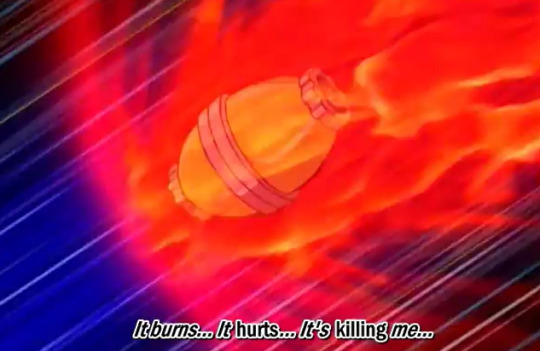
Yubel connected to his dreams called out for Judai every night, only for Judai’s parents to give him surgery that repressed his memories of Yubel causing him to forget them entirely. Yubel then spent the next ten years alone in space, continuously subjected to painful torture, with their cries for help being ignored.
"I was suffering even as you came to forget about me..."
Yubel is then met with the question of how can Judai treat them this way if they loved him so much? As from Yubel’s perspective, they’ve only ever tried to protect Judai, only for Judai to not only throw them away, but subject them to painful torture and ignore their cries for help. Judai effectively moves on with his life, goes to duel academy, makes friends while Yubel is left to suffer in silence all but forgotten. This is where Judai’s ignorance has serious plot consequences.
It’s not just the pain that Yubel endured that made them snap. It’s that their pain went ignored.
Yubel holds out the faint hope that Judai will answer their calls fro help until they finally burn up upon re-entry into earth’s orbit. At which point they’re left as nothing more than a single hand crawling on the ground. Yubel who cannot fathom why Judai would cause them so much pain, and then forget about them, convinces themselves that Judai must be causing them pain, BECAUSE he loves them.
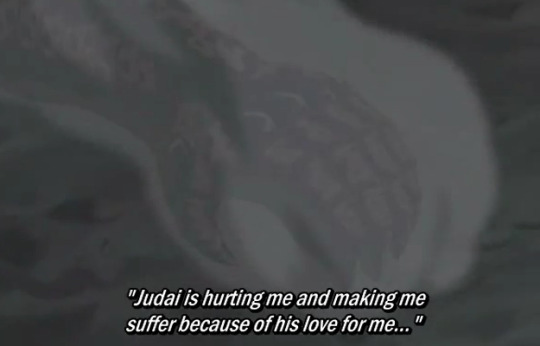
But you see, I couldn't possibly forget about you in the time that I've suffered...
Judai is allowed to move on with his life, to make friends, to spend the next ten years doing so while Yubel is subjected to ten years of agony. When they finally escape their painful torment, they see all the friends Judai has made while they’re left alone and forgotten. However, Yubel’s goal isn’t revenge. Rather, it’s to make Judai share and recognize their pain. WHich is why I said it’s not the fact that they were made to suffer, but their suffering is ignored. Yubel’s entire philosophy revolves around the idea that sharing pain is an expression of love, and that they and Judai share their love for each other by hurting each other.
"That's why I sought to fill all those linked to you, your world, with both sadness and anguish..."
For Yubel, making all of Judai’s friends suffer and Judai themselves suffer is a way of making them and Judai equals again. They want to show “their love” for Judai, but it’s more about forcing Judai to recognize the pain he’s caused them by forcing him through the same pain. Yubel’s philosophy of sharing pain is actually a twisted form of empathy.
They’re not entirely wrong either, that even people who love each other can cause each other pain, and that if one person is suffering alone in a relationship or the suffering is one-sided then there’s something wrong with that relationship.
Yubel: I get it now… You weren’t in love, with Echo. Yubel: No.. you may have loved her just enough to clear the conditions in palace for you to control Exodia, but the you didn’t truly love each other. Yubel: You were only unfairly hurting her, while you stayed unharmed. You wouldn’t suffer. You wouldn’t suffer. You wouldn’t be in pain. Amon: What are you getting at? Yubel: I’ve been hurt! I’ve suffered! I’ve been in pain. That’s why I’m making JUdai feel the same things I did!
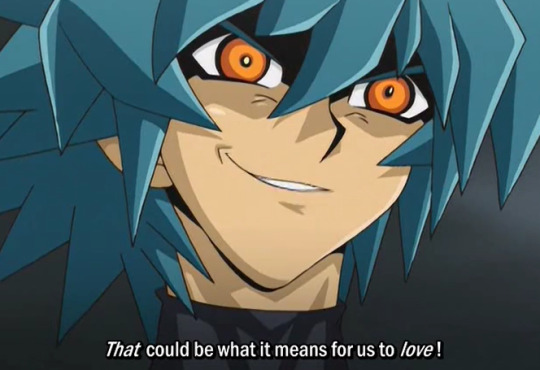
Yubel’s twisted theory of love, is a pretty thinly veiled cry for empathy.
They break out into tears when talking to Amon about the way they’ve hurt and suffered. They clearly state upfront that their goal is for Judai to recognize their love. One of the first things they say to Judai is a plea for Judai to remember them.
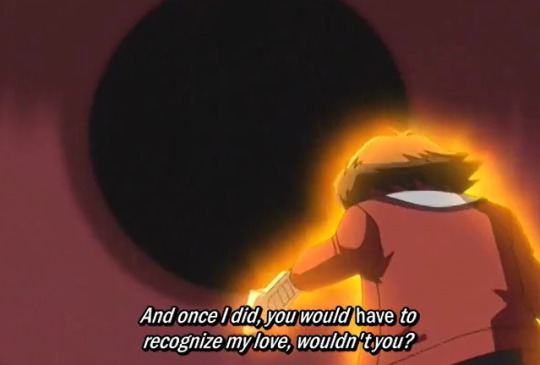
Yubel is presented as a very human character suffering through a lot of pain throughout their entire villai arc, they break down into tears multiple times, they cry out in agony, they're visibly suffering and you see their mental walls begin to break down when Judai denies them any empathy.
Yubel is actually incredibly clear and straightforward about their desire to be saved by Judai. However, Judai doesn’t lift a single finger to help Yubel the entire arc, even though they themselves admit they are directly responsible for Yubel’s suffering but they helped create who they are today.
Judai plunges into a different dimension and gives up everything to save someone, but it’s Johan, not Yubel they try to save. You have Johan, the perfect friend, and perfect victim that Judai gets obsessed over and will not stop at anything to save, and then you have Yubel, the imperfect victim that is actively harming Judai and all of his friends that Judai chooses to ignore. The whole season Judai only focuses on saving the perfect victim Johan, and this is clearly shown to be a flaw. Judai doesn’t just ignore Yubel to save Johan, he also ignores every single one of his friends.
Judai only caring about saving Johan, and deliberately ignoring and abandoning the friends who came with him to help, essentially abandoning them the way he did Yubel leads to another consequence. After he abandons them they get captured, rounded up, and actually die and become human sacrifices.
Losing his friends, causes Judai to snap. Judai becomes the supreme king and decides power is all that matters; he starts killing duel spirits en masse in order to forge the super polymerization card. Which means being left alone, suffering alone, being abandoned by everyone causes Judai to snap the exact same way that Yubel did.
In fact Judai is only saved from his darkest moment, because two of his friends sacrifice their lives, trying to get through to him and appeal to his humanity. At that point Judai’s friends could have just chosen to put him down like a mad dog, to punish him for the amount of people he’s killed, but instead they try to save him because of their friendship.
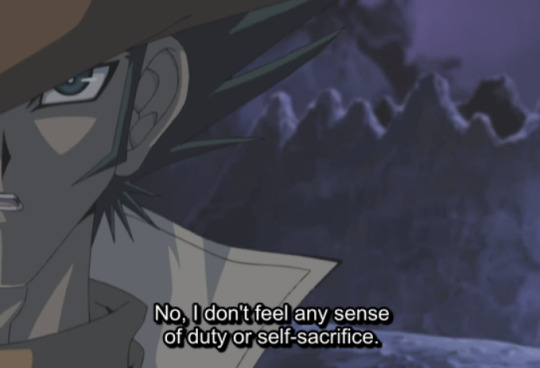
I just want to save my friend. That is all.
By the time Judai is facing Yubel in their final fight, Judai doesn’t have the moral highground against Yubel in any way whatsoever. They’ve both lashed out because of the pain they endured and killed countless people in the process of lashing out. The only real difference between them is that Judai is lucky. He had friends to support him at his lowest point, while Yubel didn’t. Does Judai learn from Jim’s example, and go out of their way to save Yubel the same way they were saved because Yubel is still a friend? Nope, Judai tries to kill Yubel at this point.
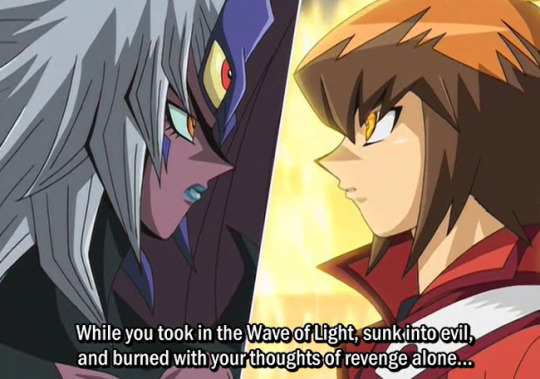
I made a lot of friends... And they all taught me something… real love is wide enough, large enough and deep enough to fill the universe. Your so-called love is only a conceited delusion.
Like, Judai, sweetie baby honey darling. How was Yubel supposed to make friends when they were floating in the empty void of space?
Judai hasn’t learned, they are still ignorant, and still turn a blind eye to Yubel’s suffering. After all if his love is wide enough, large enough,and deep enough to fill the universe then why don’t thy have any room in their heart whatsoever for empathizing with Yubel?
Judai making friends while Yubel was trapped in space doesn’t make Judai a better person than Yubel, it makes Judai lucky. Judai doesn’t even appreciate that luck, because he treats his friends like garbage. It’s not about whether Yubel is worthy of salvation, because Judai is a mass murderer and his friends still went to great lengths to save them anyway. It’s that Judai doesn’t want to empathize with Yubel, because they still want to remain ignorant and irresponsible. Judai wants to continue playing hero, with a very black and white definition of what a hero is. By this point Judai’s killed lots of people, but if he makes Yubel the villain in the situation, he can keep playing hero. He doesn’t have to look at himself and what he’s done, because blaming everything that happened on Yubel and then putting Yubel down like a mad dog allows Judai to absolve his own guilt. Judai practically ignores Yubel’s cries for help, even when Yubel spells it out for them.

I couldn't have lived with the heartache unless I felt that I was being loved...
At this point Yubel themselves acknowledges that their love was just a delusion. That it was a coping mechanism, because they couldn’t live with all the pain otherwise. WIthout it they would have just died, which makes Judai unmoved. The implication here is that Judai thinks yes, Yubel should have just died in that crater. It would have been easier for Yubel to die a perfect victim, then for Yubel to crawl out of that crater and go on to hurt other people. While that may be true the same can be said for Judai - it would have been better if Judai died rather than become the Supreme King. His friends could have put him down like a mad dog, you could have even called that justice - but they didn’t. Judai making no attempt to save Yubel isn’t because he thinks it’s morally wrong to save someone who’s killed as many people as Yubel has, or because he thinks he can’t forgive Yubel, it’s because Judai is taking the easy way out. Johan is a nice, easy victim to save, because he’s Judai’s perfect boyfriend, while Yubel is a complex victim that requires Judai to understand their suffering. Even the act of saving Johan isn’t about Johan himself, it’s about the fact that Judai feels guilt over Johan’s disappearance. What Judai wants isn’t really to save a friend, but to stop feeling guilty over that friend. Judai isn’t just disgusted by Yubel’s actions towards his friend, he also wants to avoid the guilt he feels over causing all of Yubel’s suffering, because it requires acknowledging the complex reality that he is both victim and perpretrator in this case, just as Yubel is both victim and perpetrator.
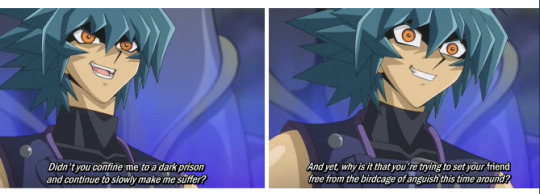
So how can an arc where Judai doesn’t try to save Yubel until the last possible minute, be better than an arc where Deku makes it his goal for the final act of the manga to save the crying boy in Shigaraki?
It’s because the story does not let Judai get away with his continual refusal to empathize with Yubel. Yubel’s entire character revolves around empathy, in the form of sharing pain. As a duel monster, Yubel’s effect is that they are a 0/0 attack monster who is immune to all damage, but when you attack them they deal all the damage back to you. Which means that Yubel will respond to all the pain they feel, by causing you just as much pain in return. Yubel is not a character who can be defeated in a fight, or a duel. In fact they’re the only Yu-Gi-Oh villain who never loses a duel once. The most Judai can do is duel them to a draw, and they draw three times. Yubel wins against everyone else who challenges them. In a way Yubel is like Shigaraki, the ultimate, unkillable enemy that can’t be done away with violence. Judai’s refusal to empathize with Yubel or attempt communication also makes them worse, every time Yubel is hurt they escalate. THe more Judai hurts them, the more they will hurt in return, it’s a cycle that will never be broken simply by killing Yubel, because Yubel is unkillable.
Not only that but the story has gone to great lengths to show that saving Yubel is the correct course of action. If Judai doesn’t save Yubel, he’s basically spitting on the selflessness Jim showed in saving him. In fact if he doesn’t save Yubel, Judai is contradicting his own words on what makes a good friend. Sho once asks Judai after witnessing his brother change, what he should do if a person you lov ehas changed into an entirely different person. What if they're a person you don't even recognize any more? A person you don’t even necessarily like anymore?
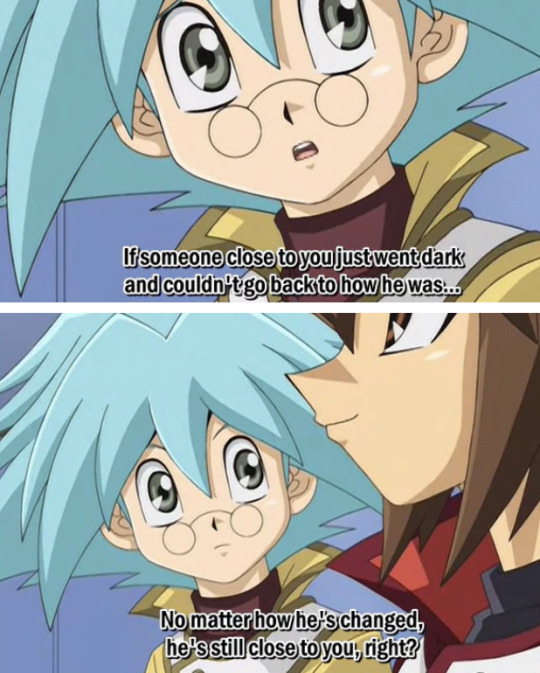
That's why if it were me. I'd probably just be looking after him until the very end, even if I didn't like him. I'd do it cause I think it'd prove that I care about him.
Judai doesn't even say that Sho is obligated to save his brother or morally redeem him, just that he has to keep looking at him instead of turning away or ignoring him.
Judai is being a bad friend, by his own definition. By choosing to deliberately look away from Yubel, Judai’s not living up to his advice for Sho for how you treat people you care about.
Which is why the resolution for Judai and Yubel’s arc is so important, because it’s done by Judai finally acknowledging Yubel’s pain, and promising to watch over them from now on, words that are followed by the action of physically fusing their souls together so they’ll never be alone again. Judai doesn’t just say pretty words about how they won’t ignore the crying child inside of Yubel, but instead he makes a sacrifice to save Yubel at risk to themselves to show their words are backed up by actions. Judai says Yubel will never be alone again, and then he commits.
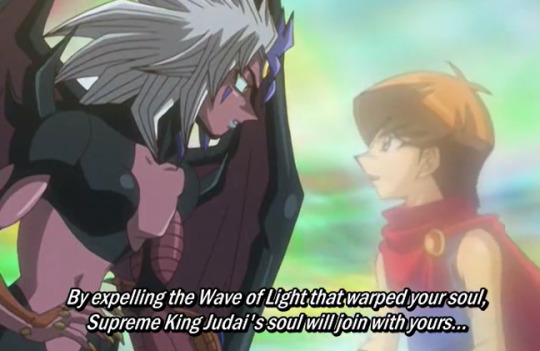
"And even if that means I won't exist anymore... I don't care."
Judai has resolved his character arc by this action, because Judai is finally taking on responsibility and that responsibility is watching over Yubel, so the two of them can atone together. Judai even says himself this isn’t an act of sacrifice on his part, but rather him finally accepting adult responsibilities.
Judai: I wouldn't sacrifice myself for you guys. I'm just going on a journey to grow from a kid into a man.
Judai needed to save Yubel to complete his character arc and grow as a person. If Judai hadn’t saved Yubel, he would have still remained an ignorant child. By learning not to turn a blind eye to Yubel’s pain, and also smacking sacrifices and physically doing something to atone for the way they ignored Yubel up until this point they’ve not only saved Yubel they’ve also done something to address their wrongs. This also continues into the fourth season where Judai’s personal growth results in him learning what kind of hero he wants to be as in Season 4 in order to atone for the spirits that Judai slaughtered, he decides to leave his friends behind and walk the earth with Yubel helping spirits and humans get along with each other. In fact Judai’s final speech as a character isn’t even about how strong he is as a hero, but how weak he is as a person.
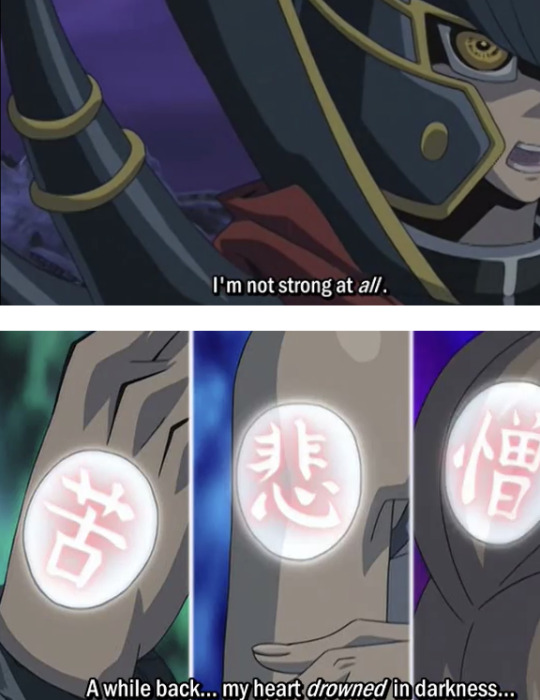
And I put my friends through some rough times. Form that, I figured a few things out... all I can do is believe in them.
The lesson Judai learned is because he’s weak, he needs to empathize and believe in other people the same way that his friends once believed in him when he was at his lowest point. Judai’s not the strongest hero, he’s the weakest one, but that gives him the ability to empathize with people who were lost just like he was, and guide them back from the darkness.
The story of how Deku became the worst hero.
I’m going to say this right now it might turn out next week that Shigaraki is just fine, and he’ll use the overhaul quirk to reconstruct his body. However, even if that happens Deku has completely failed at his goal of saving Shigaraki for the reasons I’ll illustrate below. In theory, Deku’s arc of saving Shigaraki, and therefore winning by saving should be much easier for the story to accomplish and also much less frustrating to watch. After all, Shigaraki has been around since the beginning of the manga, he’s literally the first villain that Deku faces. He’s also the first villain that Deku talks to, where he brings up the idea that there were some people All Might failed to save. There’s also many intentional parallels between the two characters, the entire manga is about their parallel journeys of becoming the next generation hero and the next generation villain. Shigaraki even directly quotes the line at one point that all he wanted was for someone in his house to tell him he could still be a hero, the same line Deku said in the first chapter was that he wanted his mom to tell him to be a hero instead of apoalogizing to him for being quirkless.
Not only is the setup for Shigaraki and Deku made obvious (Deku can redeem Shigaraki by telling him that he can still be a hero too), but Deku himself states out loud that he wants to save the crying child inside of Shigaraki.
Judai runs away from Yubel the whole time, whereas Deku is running towards Shigaraki and actively makes it his goal to understand Shigaraki and continue to see him as a human being rather than a villain. The story also makes it clear that saving Shigaraki is necessary to saving hero society as a whole. After all Yubel is just Judai’s victim. Whereas Shigaraki is the victim of all of society. He’s the crying child who was ignored. The cycle won’t be broken if heroes continue choosing to ignore people like Shigaraki, because more victims will grow up to replace him.
Shigaraki: Everything I've witnessed, this whole system you've built has always rejected me. Now I'm ready to reject it. That's why I destroy. That's why I took this power formyself? Simple enough, yeah? I don't care if you don't understand. That's what makes us heroes and villains.
Shigaraki rejects the world because the world continues to reject him. THe solution to this problem is not rejecting Shigaraki, because Shigaraki won’t go away, the system will just continue to reject people like Shigaraki. As long as heroes and villains don’t understand each other, they’ll keep being forced to fight and the conflict won’t end, because hero society is what engineers it’s own villains.
clear as day by the story itself. If the objective of saving Shigaraki is clear, then how exactly did the story fail in this objective? What went wrong? In this case it’s a failure of framing, and breaking the rules of “show don’t tell.” Stories are all about actions and consequences. When a character makes a certain action in a story, the way other characters around them, the world, and whatever consequences that action frames that action in a certain light. It provides context for how we are supposed to interpret that character in that moment.
For example, when a character does something wrong and another character directly confronts them over what they did wrong, that frames them as in the wrong. The story is criticizing the character for what they did wrong. Context is everything in a story. Stories are just ideas, so they require framing and context to communicate those ideas for the audience. Certain character attributes can be strengths or flaws depending on the context. My go to example is that if you put Othello in Hamlet, the conflict would be resolved in five seconds because Othello’s straightforward personality and determination would have him kill Hamlet’s uncle without questioning things. Whereas, Hamlet constantly questioning and second guessing himself would lead to the worst ending possible. However, if you put Hamlet in Othello, then Hamlet wouldn’t fall prey to Iago’s manipulations, because Othello doubts and questions everything so he wouldn’t believe Iago the way Othello did.
Hamlet’s contemplative and introverted nature can be a strength in one situation, and a flaw in another. Othello’s tendency to act without thinking things through can be a strength in one situation, and a flaw in another. Context matters, because context tells you how you’re supposed to interpret a certain characters actions, and therefore tells you more about that character. This is why people repeat “Show don’t tell” as the golden rule of storytelling, it’s one thing to say something about a character, it’s another to us the characters actions in the story itself to show them something about the character.
What’s even worse then breaking the rules of show don’t tell however, is telling the audience one thing, and then going onto show in the narrative something completely different. In that case the narrative becomes muddled and confusing to read. If I the narrator say “Hamlet is someone who overthinks everything” and then in the story Hamlet walks up to his uncle and kills him with no hesitation, then the narrator is straight up unreliable. It becomes impossible to tell as an author what message I’m trying to get across about these characters, because I’m telling you one thing and showing another.
This is why the writing fails in the second half of My Hero Academia because we are constantly told one thing, but then the story shows something entirely different and sometimes even contradictory to the thing we are being told.
Judai is a much worse hero than Deku, he always runs away from Yubel, and we’re never directly told that he’s supposed to save Yubel either. However, the narrative is incredibly consistent. Judai’s behavior of running away is consistent with his character. All the other character call Judai selfish for abandoning his friends (and they’re not even talking about Yubel). Judai is never painted in any positive light for his actions, therefore we as the audience understand Judai’s behavior is wrong and he needs to fix it. The narrative makes it clear that Judai needs to grow up, and Judai is never rewarded for his refusal to grow up, he’s ruthlessly chewed out, not by his enemies but also by his own friends. However, the narrative isn’t merciless on him either. Season 3 of GX is dark, but it’s not grimdark. Even when Judai loses his way, he’s still shown love and compassion by those same friends who go to great lengths for his sake. The narrative criticize Judai but it never insists that he’s beyond redemption and needs to be put down like a mad dog.
The message is very clear, that not only does Judai need to grow up, but he also deserves the chance to grow and change, which is why he should give Yubel a similar chance. In comparison the story sets out this clear narrative arc for Deku of understanding Shigaraki, but it never challenges him for failing to understand Shigaraki. If you listen to what the narrative says, how other characters describe Deku, and what Deku himself says and only read it on a surface level then yes, Deku’s goal is to save Shigaraki. If you analyze actions however, he is in effect just like Judai he never takes any meaningful action or steps towards Shigaraki, nor does he think of what saving Shigaraki might look like or entail.
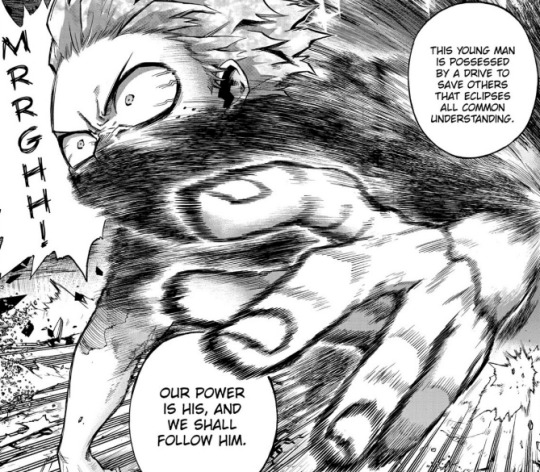
The story describes Deku as someone who is possessed by a drive to save others that eclipses all common understanding, but does the story give us any examples of that behavior?
Judai is characterized as a selfish, irresponsible child, and the story gives us countless examples of his immaturity and how it hurts others. Does the story of MHA do the same for Deku's purported virtues? Let’s run through Deku’s actions, step by step, the actions themselves and how they are framed in order to find any evidence that Deku possesses this drive to save others. Does Deku reflect at all on the question of:
Can Shigaraki be Saved?
Deku leaves on a journey to try to understand villains. When he makes a perfunctory attempt to understand and empathize with Muscle, and Muscle replies that some people are just evil does Deku keep trying to reach his heart? Nope, he just punches him.
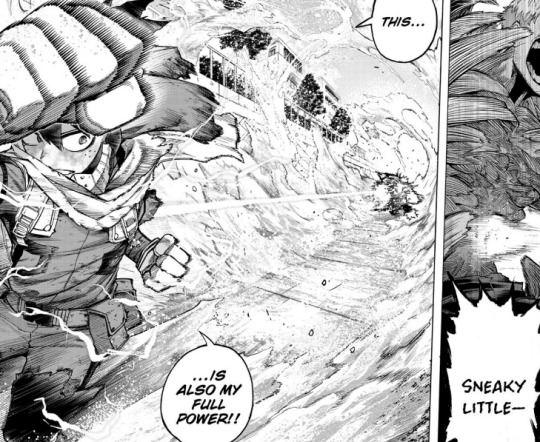
Well, if he’s failed in his goal of understanding a villain then does the story call him out on his failure? Does Deku face any sort of narrative consequence for that failure? Is he framed negatively for failing to understand Muscle, the same way that Judai is framed for abandoning Yubel? Nope. Deku doesn’t express any frustration at all over is inability to reason with Muscle. There’s also no negative consequence for Deku just choosing to punch muscle, it turns out that there was no reasoning with Muscle and some people are just bad eggs so Deku was right. It’s okay for characters to fail, but if a character fails and it’s not framed by the story as a failure then the writing itself as failed. Why even bother to include this scene in the first place if it doesn’t advance Deku’s character in any way? This scene in spite of showing Deku failing to understand someone actively paints Deku in a positive light, because of how much stronger he is ow that he can OHKO a guy that gave him trouble all the way back in the camp arc.
This scene doesn’t tell anything about Deku as a character, it just makes him look cool. In fact that’s precisely the problem, Deku isn’t adequately challenged as a character, because he’s never allowed to fail. Even when he does obviously fail at the things the narrative set out for him to do, he’s never challenged on those failures, because the priority isn’t to make Deku grow, it’s to make Deku look good. As I said before, Judai is the hero because he’s the weakest. Deku is the hero because he’s the strongest. Well, next a big flaw on Deku’s part is that he worshippd the same heroes that were making the world corrupt. Heroes like Endeavor who created people like Dabi. So, does Deku take action to either criticize the older generation of heroes, or separate himself from them in order to try to be better than them? Nope, he teams up with them. Not only that, Deku can’t do something as simple as tell Gran Torino out loud about his plans to save Shigaraki. If Deku feels that Shigaraki is worthy of salvation then he should at least try to make an argument here about his ideal of saving others.
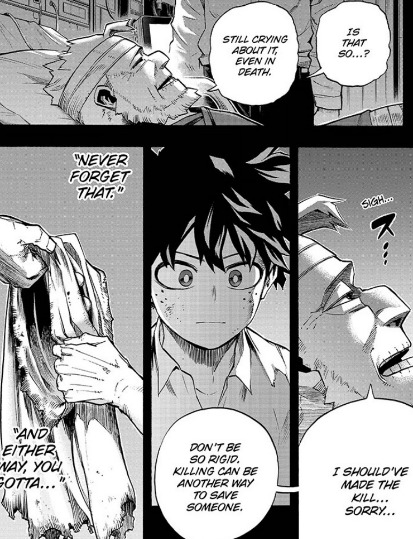
Now here’s the thing, if Deku hadn’t directly looked at the camera and told us he wanted to save Shgiaraki, would we be able to deduce his intentions from his actions? If you took away all of Deku’s internal monologue, and just showed him punching Muscular and saying nothing when Gran Torino says he may have no choice but to kill Shigaraki would anything about Deku’s actions indicate that he wants to save Shigaraki? Let me use avatar the last airbender as a positive example for a moment. People say that Aang’s desire to spare Ozai’s life comes out of left field, but like if you analyze Aang as a character down to their bending, and the way they react in situations they always prefer de-escalation, or taking a third option as opposed to confronting things head on. It’s literally why Toph says Aang has trouble learning earth bending, because as an airbender, he always tries to look for some other way to solve the problem, instead of a direct confrontation with force. As early as season one, Aang tells Zuko someone who has tried to kill him several times that he was friends with someone from the fire nation one hundred years ago and in a different situation they could be friends. Aang’s desire to save the Firelord may not have been told to us until the last possible minute, but Aang’s aversion to violence has always been a part of his character from the beginning. However, Deku never shows any similar aversion to violence. There’s basically no example where he ever tries to de-escalate a situation, or he avoids a conflict by seeking a third option.
Anyway, let’s move onto the next example. In the confrontation where Lady Nagant fights Deku, when Deku learns the fact that the heroes were employing government hitmen to attack people for uhh… exercising free speech does Deku give any reaction to this information? When Lady Nagant says that Deku is only going to bring back the status quo, does he show her any meaningful evidence that he won’t do that.
Deku’s response is because the world is so grey, he needs to extend a helping hand to others. Which you know what thay could be a response. Deku saying that his response to the corruption of the hero world is that he now understands that society led some people down the wrong path, so his way of addressing the wrongs of that society is lending a helping hand to as many people as possible even people he used to think was irredeemable.
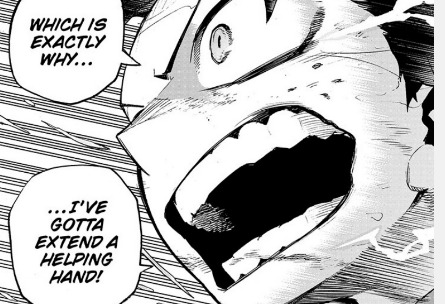
I will give Deku the benefit of the doubt, I think this is an acceptable answer. I can’t save everyone, but that’s not going to stop me from trying to save as many people as possible and maybe I can save people who were this society’s victims on the way too. However, does Deku demonstrate his resolve to extend a helping hand in any meaningful way.
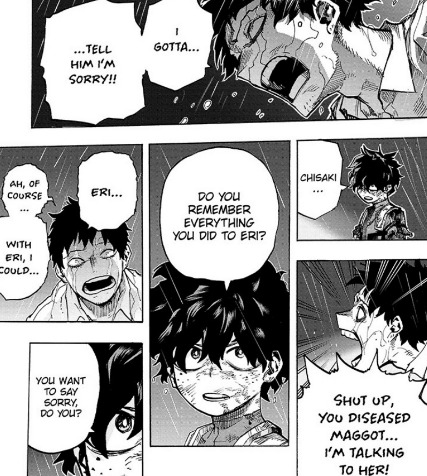
Deku is met with an armless, insane Overhaul who’s begging for someone to help heal his father figure in the Yakuza from his coma. This isn’t like Muscular who insists that there’s no helping him, Deku is met face by face with someone asking him for help. Deku’s gotta extend a helping arm whenever he can, because he knows some people were abandoned and led astray by this society… Unless that person is someone he doesn’t like personally. At which point he only helps them on a conditional basis. We are told Deku will save anyone and everyone, but Deku is met face to face with an armless man who is begging for help and Deku’s does nothing to help him. Deku’s not criticized for refusing to help overhaul either, it’s never brought up again. When Deku begins to experience a mental breakdown because of all the people he’s trying to help in the Dark Deku arc, we are told this is the result of Deku trying to save everyone, but we do not see Deku attempting to save a single villain after Muscular and Nagant.
He exhausts himself beating up villains that AFO sends after him, and only helping innocent civilians. Which would be fine if this arc were about how Deku is running away from his real responsibilities the same way that Judai was running, but that’s not what we’re being told. We are told that this is all part of an arc of Deku learning to understand villains and be a hero.
Deku is asked “Can you save Shigaraki?” by the story, but Deku never at any point has to deliberate on that question. Judai doesn’t deliberate on that question either, but him choosing not to think about things and stay ignorant is the point.
It’s actually fine to make Deku stagnate as a character. It’s fine to have him take the easy way out by just punching villains and giving up on them after one conversation. It’s fine for him to be empathetic to other people’s suffering, or even self-righteous. It’s fine for him to be ignorant.
He could be all of those things if it was a part of a narrative teaching him to unlearn his behavior. In fact the narrative might have been better if Deku started out by saying he didn’t want to save Shigaraki, that there was no choice but to kill him, because then at least his actions would be consistent with his words. Then his lack of empathy and his tendency to resort to violently beating up villains instead of avoiding violence would be character flaws he could work on. Deku however, is presented to us as this empathic hero who is always willing to give others a second chance though he never actually sticks his neck out in order to do so. Continuing on with our slow crawl through MHA, one of Deku’s friends is revealed as the traitor. Deku has a heartwarming scene fo saying that Aoyama can still be a hero, but look at his actions. He lets the adults in the room physically tie Aoyama in a straightjacket and imprison him, for the crime of… doing bad things while he was in a hostage situation. Apparently, if a bank teller helps the bank robber by giving them money when the robber has a gun to his head, the swat team should just snipe the bank teller. Not only does he not defend Aoyama against the adults, or stand up for him, or tell the adults they’re wrong to treat Aoyama a clear cut victim who had a gun to his head and was bing held hostage like he’s a villain - he also lets the adults use Aoyama an innocent victim as bait in order to lure out AFO. Deku tells Aoyama he can still be a hero, but he doesn’t defend Aoyama as a victim of being taken hostage, nor does he stop the adults from further taking advantage of him and throwing him right into danger. Some people are just led the wrong way that’s why they need to be extended a helping hand, but fuck Aoyama I guess. He needs to earn the right to be sympathized with by physically putting his life in danger.
Deku can’t even go out of his way to save a friend who he’s known for the better part of a year, when that friend is a complex victim forced to do bad things.
Then Deku and Uraraka have a conversation where they both, kind of ruminate on the idea that maybe the villains are human beings who are worthy of sympathy.
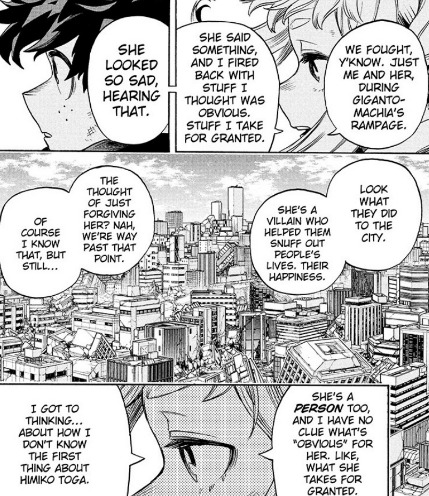
In fact Uraraka is actively trying to dehumanize Toga by looking at the destroyed city, so she won't have to think of Togaas a person.
The language here is also a major fault of this arc. It focuses far too hard on “forgiveness” over and over again. As I said before, saving Shigaraki isn’t about Shigaraki at all, it’s about Deku, and how he wants to use his power as a hero. Deku has even stated himself that he doesn’t believe that OFA is a power that should be used for killing people. So why does whether Toga or Shigaraki are forgivable or not even matter? It’s the same with Deku refusing Overhaul any sympathy. If he’s so morally opposed to abusers, then why does he work with Endeavor and defend him at every visible opportunity, even in front of his victims? Whether or not Deku can forgive Shigaraki doesn’t matter, because Deku is not the moral arbitrator or right and wrong. In fact Deku doesn’t even have any morals, so how is this a moral debate? Is there any point where Deku gives a clear definition of what he thinks right and wrong is? Does he quot Immanuel Kant to the audience?
Batman doesn’t kill people, not because he thinks that every last person on earth can be saved, but because Bruce Wayne an incredibly rich white man thinks that maybe he shouldn’t have the authority to decide who lives and who dies. When Bruce doesn’t kill the joker, it doesn’t mean he thinks the Jokers actions are forgivable, it’s because Bruce thinks it’s not his place to determine whether someone has the right to live.
The whole conflict that MHA presents us is that heroes pick and choose who to save, and only save the ones they deem as innocent. So, how does Deku saying repeatedly they can’t forgive Shigaraki contribute to that theme in any way? In fact by focusing on forgiveness, rather than whether or not he personally has the right to pick and choose who lives and who dies Deku is ignoring the elephant in the room. The question isn’t about whether Shigaraki’s redeemable or if his deeds should ever be forgiven. The question is whether Deku has the right to decide who gets saved and who doesn’t.
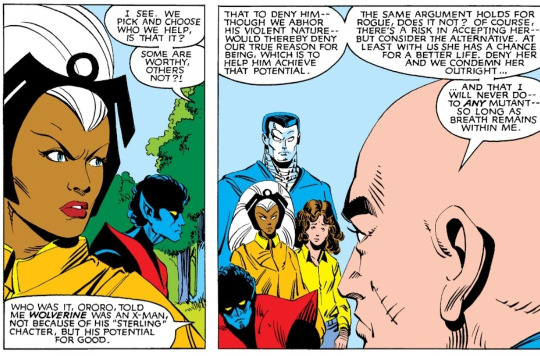
We are told that Deku as a character is someone who wants to save everyone no matter what, so Deku shouldn’t be focusing on whether or not Shigaraki is worthy of forgiveness, he should be making an idealistic argument like Xavier does in this panel. Why doesn’t Deku talk out loud with Uraraka on how he believes his power is for saving others, and not killing? If he’s meant to represent some idealistic hero, then why doesn’t he even talk about his ideals? Why don’t I as the reader know what those ideals are?
I think Xavier’s ideals of forcing the X-men to provide a good example to the mutant community, in order to try to earn the respect of other human beings is wrong, but at least he has ideals. He tries to inspire the other people around him to live up to those ideals. The story can criticize him for his ideals and point out how they’re wrong, while it can also uplift parts of his idelogy like where he believes there are no evil mutants. Deku has a chance to do the same to Uraraka, to tell her clearly, “I don’t think we as heroes have the right to pick and choose who we help…?” but he waffles. Not only does he waffle, but this moment is meant to be read as an indication that both Deku and Uraraka are sympathetic individuals who want to save their villains. They are supposed to look good and idealistic here and they don’t. For Deku it just seems like a repeat of his behavior with Overhaul. The only villains that are worthy of sympathy, are the ones that he personally decides are forgivable.
The story isn’t about whether or not it’s moral to save someone who’s killed as many as Shigaraki has. The story never seriously discusses any sort of complex morality or moral philosophy. Once again to bring up avatar, yes you can argue Aang sparing the life of a war crimminal is bad, but Aang mentions on multiple occasions that he wants to retain the cultural values of the airbending people. Aang has a morality, a consistent morality, it might not be a morality you personally agree with but at least he has one. Deku hates abusers, unless he’s next to Endeavor then he thinks abusers should be given the chance to atone. Deku doesn’t believe that One for All is a power for killing, but he never stands up to any of the adults who are blatantly trying to kill Shigaraki, he doesn’t even express out loud to Uraraka that he doesn’t think heroes have the right to decide who lives and who dies. In fact he’s given the perfect opportunity to, when Hawks kills a villain and it’s broadcast live on the news in font of everyone, but Deku never has anything to say about that. The reason Deku and Uraraka both put such an emphasis on “forgiving” their villains has nothing to do with the story itself. It’s because the author Horikoshi, is afraid that some people will misinterpret his story as saying that he actually thinks that saving a villain like Shigaraki means that he condones mass murder, so he has to have the characters talk about not forgiving Shigaraki.
Judai doesn’t have any consistent morals either, but once again that’s the point and something the story relentlessly calls him out on.
Cobra: Fortune would never smile on a fool like you who fights while prattling on about enjoying duels. Cobra: You are certainly a talented duelist. But you have one fatal flaw. Judai: A fatal flaw? Cobra: Yes, your duels are superficial. Someone who fights with nothing on his shoulders, cannot recover once he loses his enjoyment. What a duelist carries on his shoulders will become the power that supports him when he's up against the wall! Cobra: But you have nothing like that! Those who go through life without anything like that cannot possibly seize victory. Cobra: But I know that nothing I say will resonate with you... because you have nothing to lose but the match. Judai: I... Cobra: Afraid aren't you? Right now, you have nothing to support you.
Judai’s regularly called out for his superficiality. Judai is only a hero because he’s strong and wins fight, he doesn’t feel any responsibility towards other people, and in fact he loathes having to feel responsible for others. Judai isn’t just naive, he deliberately chooses to remain ignorant. Since he’s ignorant of his own faults, he makes awful decisions when it comes time for him to lead, and his friends die because of choices he made. We are told that Deku doesn’t want to remain ignorant, that he wants to understand villains, but Deku’s actual actions are him continuing to ignore society’s ills and the suffering of victims. In fact if you take away Deku’s internal monologue and the narration, Deku’s actions almost exactly mirror Judai’s.
Deku is just as superficial as Judai, and he also doesn't want to spend any time thinking about what kind of hero he wants to be, but the narrative never punishes him for it.
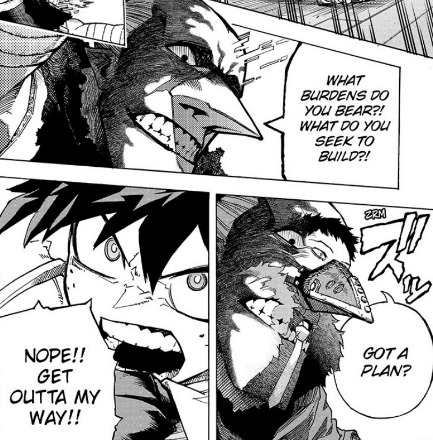
Judai is asked what burdens he has to bear and he has to meaningfull answer that question, Deku is allowed to get away with not having to think about anything. Deku remains superficial. Both Judai and Deku spend the entire arc running away from their villain rather than confronting them in any meaningful way. They both never express out loud any sympathy for their villain, or try to empathize. THey both never step down from the role of hero, and only confront their villain as a hero, because they don’t want to think about themselves as complicit or in the wrong. Shigaraki and Deku’s final confrontation mirrors Judai and Yubel’s but without the same clear framing. THe entire time Yubel is trying to get Judai to empathize with them, and Judai only responds with physical violence, because they don’t want to stop being the hero and because they can’t see Yubel as anything other than the villain. As soon as Deku arrives on the battlefield (by the way everyone else and their mom pointed this out, but Deku who doesn’t think OFA is a power for killing, is completely okay with a plan called the “Sky coffin plan” where every other hero was clearly trying to murder Shigaraki).
When Deku arrives he asks if Shigaraki is still in there, but he doesn’t do anything to try to reach Shigaraki, he jumps right to punching him. In fact he never tries anything besides punching him as hard as possible. How is punching Shigaraki with the force of a thousand suns saving him exactly? How is that different from how he tried to defeat Shigaraki the last war arc, before he saw the image of the crying child that made him want to try a different approach in saving Shigaraki? In Judai’s final fight with Yubel, it’s made explicitly clear that Judai is not trying to save Yubel, and that’s a fault on his part. In fact Judai gives the traditional “I have friends, and you don’t” speech to Yubel but it’s a subversion of how that speech is usually used. Usually that speech is used to show that the protagonist won because of they valued friendship,while the villain treated their friends poorly and only cared about power. However, it’s ironic in this case because Judai got all of his friends killed. Judai treats his friends like garbage. This speech isn’t used to show that Judai is winning because he values his friends more than Yubel does, it shows that Judai is a hypocrite, playing the hero in this situation where they are just as bad as Yubel. Judai’s not morally superior, he’s just lucky that he has good friends. Friends that were willing to save him. The only connection Yubel has to anyone else, Yubel’s only friend is Judai and Judai is a shit friend.
In fact, Mirio tries to give a version of the “You don’t have any friends” speech to Shigarkai, only for Shigaraki to get mad and tell Mirio that he does have friends and people he wants to protect.
This fact is also something that is blatantly ignored by Deku, even though Mirio tells him about it… even though we are told that Deku is trying his best to see the humanity in Shigaraki.
Judai blatantly admits they’re trying to kill Yubel. Which makes them a worse person, but a better character than Deku, because their actions are clearly framed by the narrative and consistent.
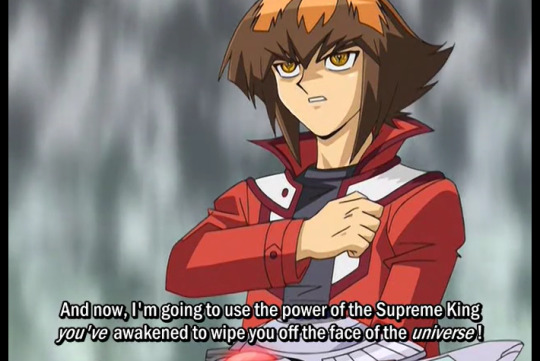
On the other hand we are told that Deku doesn’t want to kill Shigaraki, and yet everything Deku does makes it look like he’s just trying to kill Shigaraki and put him out of its misery. If we didn’t have Deku stating out loud that he wants to save Shigaraki and wants to see him as a human, there’d be nothing in his actions to indicate that he’s trying to avoid killing Shigaraki. Deku says he can’t pretend he didn’t see Shigaraki crying, but like, does he ever hesitate to punch Shigaraki, does he ever think that causing Shigaraki more harm is wrong when he’s already suffered so much? Deku says that Shigaraki is a person but does he treat him like a person? Does he try to talk to him like a person? To use avatar again, Aang does talk to Zuko pretty early on. Deku doesn’t even give the classic “We could have been friends under different circumstances” speech. When Shigaraki resists Deku’s attempts to see him as a person or emapthize with him, Deku’s response is to just resort to punching harder.
Which is in effect the same thing Judai does to Yubel, just kill them as a villain so they don’t hurt anybody else, but framed in an entirely different light. Judai is shown to be ruthless, and cold in his attempt to only settle the conflict with Yubel by violently putting them down. On the other hand we’re being told that Deku is compassionate and empathic while he punches Shigaraki with the force of a thousand suns.
There’s another eerie similarity between both of these final confrontations. At the climax of the confrontation, both Judai and Deku have a psychic vision where they see events from Yubel and Shigaraki’s childhood. This vision is supposed to help both characters understand the good in the villain they’re facing.
Let’s see the contents of this vision and how the visions change each character. Judai is shown a vision of his past life where Yubel sacrifices their entire body, and even their humanity to go through painful surgery to turn into an ugly dragon, all for the sake of protecting Judai in a previous life.
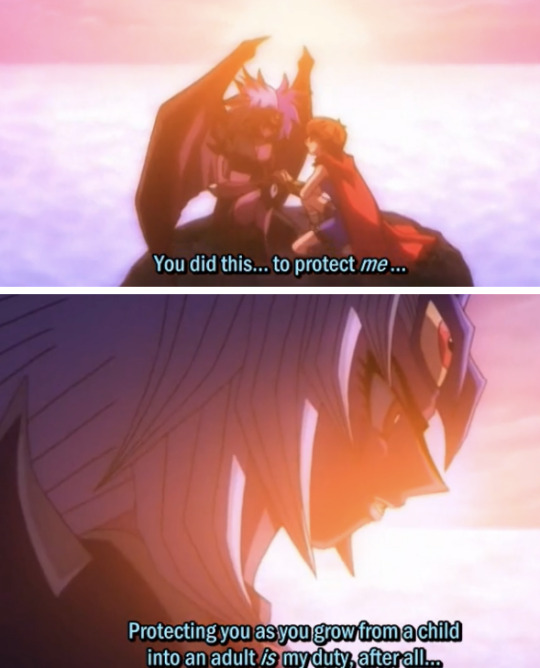
Judai is then forced to witness the good side of Yubel they’ve been ignoring all along to paint them as a villain. Yubel is simultaneously extremely selfish and willing to hurt people Judai cares about, but they’re also extremely selfless and will do anything to protect Judai and have made great sacrifices in the past for Judai’s sake. Deku gives lip service to not ignoring the humanity in Shigaraki, but Judai is literally forced to acknowledge the humanity in Yubel. Not only that, but Judai changes his behavior immediately after learning this new information. After seing the sacrifice that Yubel made for him in the past, Judai responds with a sacrifice of his own. A sacrifice that perfectly mirrors the sacrifice that Yubel once made for him. Yubel gave up their humanity for Judai, so Judai fuses his spirit to Yubel’s, becoming a human / spirit hybrid so Yubel no longer has to be alone.
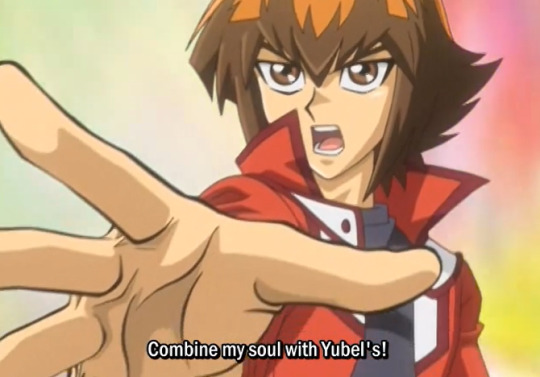
Judai also doesn’t just fuse their soul with Yubel’s in order to stop Yubel from destroying everything, it’s because both of them at this point need to atone together, and Judai is fulfilling his responsibility of watching over his friend until the end to prove that you care about them - as he said to Sho. Judai’s also fulfilling Johan’s dream of helping repair the bonds between spirits and humans, by reconciling with Yubel and repairing their bond. It’s also Judai atoning for his previous behavior of abandoning Yubel, by choosing to stay alongside them as they both atone together. Deku does sacrifice OFA during the fight against Shigaraki, but their sacrifice isn’t to help Shigaraki, but rather doing psychic damage to Shigaraki by using OFA is the only way to defeat them. He transfers OFA in order to break Shigaraki’s brain so he’ll stop reissting and Deku can beat him down. Judai fuses their soul together with Yubel out of empathy and a responsibility they feel to help their friend fater abandoning them, Deku transfers One for All to Shigaraki in order to hurt him and make him easier to punch. It's funny that Deku doesn't travel to Shigaraki's mind to learn more about him, but instead with the specific intent of harming him.
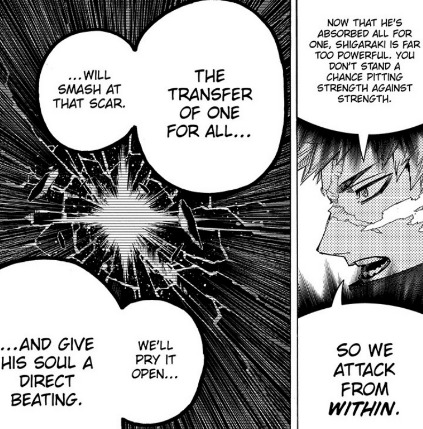
Once he's inside Shigaraki's mind, he doesn't take time to reflect on how Shigaraki used to stand up for bullied kids, or how he wants to be a hero to villains because no one else will stick up for the outcasts in society. No, he only care about Shigaraki when he takes the form of a child crying for help.
In the aftermath of the psychic vision Deku’s behavior doesn’t change towards Shigaraki in any way either. You could say he sacrificed his own arms in order to try to comfort Shigaraki within the depths of his own mind - but that’s not a real sacrifice either because his arms immediately come back. When Judai learns about the sacrifice that Yubel made in a previous life towards him, he stops seeing Yubel as an enemy and finds a way to resolve things peacefully between them. When Deku lanterns that Shigaraki’s a victim of All for One, and that his entire life was a lie, when he sees Shigaraki’s suffering first hand does his beavior twoards Shigaraki change in any way?
When he sees Afo has taken over Shigaraki’s body again, does he try to shout for Shigaraki, to tell Shigaraki to fight from the inside, to reassure Shigaraki that he’s still in there that there’s still good in him? Nope. He just punches Shigaraki some more.
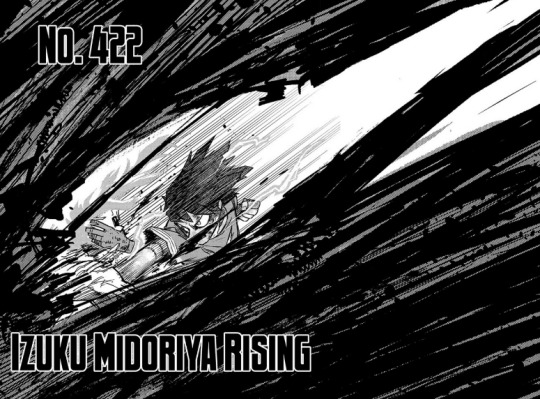
What Deku needed to tell Shigaraki is so obviously set up by the narrative too. Shigaraki wanted just one person in that house to tell him he could be a hero. Deku wanted his mother to tell him he could be a hero if he was quirkless. Deku sees that Shigaraki started out as a boy who wanted to be a hero, and who was manipulated into being a villain but does he try to appeal to the boy inside of Shigaraki by telling him he can still be a hero? Does he now see the good in Shigaraki? Nope, he just tries to kill him by punching him really hard.
I purposefully chose the images for the banner of this post, because it shows how differently MHA and GX treated its villains in the end. Yubel is embraced by Judai in the end, Shigaraki evaporates into dust.
"Judai, now that our souls have become one we will never be separated again. I have now been filled with your love and power. Let us fight together, against the wave of light leading this universe to destruction!"
Shigaraki could so easily have been given the love and empathy that Yubel was shown, but instead their life ends with no show of empathy from Deku, and with them dying believing that their long life of tragedy meant nothing in the end. Shigaraki realizes he's a crying kid, but he's never comforted.
Shigaraki: I only stole my body back from Master, and I didn't destroy anything. "In the end, I was just as you said... A crying kid, huh?"
Yubel is embraced and comforted, Shigaraki disintegrates into nothing.
One of these stories is apparently an optimistic story about heroes saving people, but it ends with the lifelong victim being killed in the most nihilistic manner possible, never receiving comfort, and never achieving anything with his long life.
The other story is a silly anime about card games, shows that when people are alone and suffering they can lash out and do terrible things. That all people are weak especially when they're alone, but the solution isn't to abandon them, or condemn them for their faults, but to believe in them and help uplift them the same way that Judai decides to uplift Yubel so they can atone together.
Which is why Deku gets an F in being a hero. Go directly to summer school. Do not pass Go. Do not collect $100.
#mha meta#ygo meta#mha 423#bnha 423#mha 423 spoilers#bnha 423 spoilers#izuku midoriya#deku#shigaraki tomura#tenko shimura#judai yuki#yubel#soulshipping#yu gi oh gx#yu gi oh
792 notes
·
View notes